Shows

Legal Talks and LecturesUChicagoLaw - Coase Lectures in Law and EconomicsUChicagoLaw - Coase Lectures in Law and Economics
2022-07-309h 29
Legal Talks and LecturesUChicagoLaw - Rule of Law Research Consortium ConferenceUChicagoLaw - Rule of Law Research Consortium Conference
2022-07-309h 29UChicagoLawSupreme Court Preview 2020: Highlights and PerspectivesOn the first Monday in October, the Supreme Court session opens. Each fall, the University of Chicago Law School invites faculty members to offer insight into some of the issues the Court will hear in the upcoming year.
This event was recorded on September 15, 2020, and features Aziz Huq, Frank and Bernice J. Greenberg Professor of Law, and Jennifer Nou, Professor of Law.
2020-09-1858 minThe University of Chicago Law School Faculty PodcastSupreme Court Preview 2020: Highlights and PerspectivesOn the first Monday in October, the Supreme Court session opens. Each fall, the University of Chicago Law School invites faculty members to offer insight into some of the issues the Court will hear in the upcoming year.
This event was recorded on September 15, 2020, and features Aziz Huq, Frank and Bernice J. Greenberg Professor of Law, and Jennifer Nou, Professor of Law.
2020-09-1858 minThe University of Chicago Law School Faculty PodcastM. Todd Henderson, "The Trust Revolution: How the Digitization of Trust Will Revolutionize...""The Trust Revolution: How the Digitization of Trust Will Revolutionize Business & Government"
In this CBI, Professor Henderson will examine how Internet platforms--eBay, Uber, AirBnB--relate to the Code of Hammurabi, Medieval guilds, the New York Stock Exchange, and corporate brands. All of these institutions, along with religions and governments and families, are in large part about providing trust to enable human cooperation. By undertaking a genealogy of trust, we can illuminate modern debates about the role and scope of government in regulating the daily lives of citizens.
M. Todd Henderson is the Michael J. Marks Professor of Law. This Chicago's Best...
2020-02-061h 04UChicagoLawM. Todd Henderson, "The Trust Revolution: How the Digitization of Trust Will Revolutionize...""The Trust Revolution: How the Digitization of Trust Will Revolutionize Business & Government"
In this CBI, Professor Henderson will examine how Internet platforms--eBay, Uber, AirBnB--relate to the Code of Hammurabi, Medieval guilds, the New York Stock Exchange, and corporate brands. All of these institutions, along with religions and governments and families, are in large part about providing trust to enable human cooperation. By undertaking a genealogy of trust, we can illuminate modern debates about the role and scope of government in regulating the daily lives of citizens.
M. Todd Henderson is the Michael J. Marks Professor of Law. This Chicago's Best...
2020-02-061h 04The University of Chicago Law School Faculty PodcastSeyla Benhabib, "The End of the 1951 Refugee Convention?"The 1951 Refugee Convention and its 1967 Protocol are among the most important human rights documents of the post-WW II period. Yet the universalization of the refugee status after the 1967 Protocol has given rise to a series of discrepancies between the letter of the Convention and the purposes it is being asked to serve. In particular, the five-protected categories specified by the Convention have come under criticism. There are also tensions between the Eurocentric discourse and jurisprudence of refugee protection and the fact that the largest numbers of the world’s refugees are housed in Third World Countries.
With globalization of the re...
2020-01-271h 07UChicagoLawSeyla Benhabib, "The End of the 1951 Refugee Convention?"The 1951 Refugee Convention and its 1967 Protocol are among the most important human rights documents of the post-WW II period. Yet the universalization of the refugee status after the 1967 Protocol has given rise to a series of discrepancies between the letter of the Convention and the purposes it is being asked to serve. In particular, the five-protected categories specified by the Convention have come under criticism. There are also tensions between the Eurocentric discourse and jurisprudence of refugee protection and the fact that the largest numbers of the world’s refugees are housed in Third World Countries.
With globalization of the re...
2020-01-271h 07UChicagoLawJoan Biskupic, "Chief Justice John Roberts: Defining the Supreme Court...""Chief Justice John Roberts: Defining the Supreme Court as its Leader and at the Center"
Joan Biskupic is a full-time CNN legal analyst and author of a 2019 biography of Chief Justice John Roberts. Before joining CNN in 2017, Biskupic was an editor-in-charge for Legal Affairs at Reuters and, previously, the Supreme Court correspondent for the Washington Post and for USA Today.
This Ulysses and Marguerite Schwartz Memorial Lecture was presented on November 19, 2019.
2019-12-021h 02The University of Chicago Law School Faculty PodcastJoan Biskupic, "Chief Justice John Roberts: Defining the Supreme Court...""Chief Justice John Roberts: Defining the Supreme Court as its Leader and at the Center"
Joan Biskupic is a full-time CNN legal analyst and author of a 2019 biography of Chief Justice John Roberts. Before joining CNN in 2017, Biskupic was an editor-in-charge for Legal Affairs at Reuters and, previously, the Supreme Court correspondent for the Washington Post and for USA Today.
This Ulysses and Marguerite Schwartz Memorial Lecture was presented on November 19, 2019.
2019-12-021h 02UChicagoLawSaul Levmore, "Addictive Law"One of Chicago’s Best Ideas was the Coase Theorem, which reminds us daily that people can bargain around law or even before legal intervention is sought. But do we have too much law and too little bargaining around it? The number of cases and judges has grown dramatically over time and many problems are outsourced to the legal system, rather than being handled person-to-person. In this talk, I will consider conventional explanations for the astonishing growth of the legal system, and then suggest that it is not entirely good news. We have become addicted to law, and like most ad...
2019-11-151h 07The University of Chicago Law School Faculty PodcastSaul Levmore, "Addictive Law"One of Chicago’s Best Ideas was the Coase Theorem, which reminds us daily that people can bargain around law or even before legal intervention is sought. But do we have too much law and too little bargaining around it? The number of cases and judges has grown dramatically over time and many problems are outsourced to the legal system, rather than being handled person-to-person. In this talk, I will consider conventional explanations for the astonishing growth of the legal system, and then suggest that it is not entirely good news. We have become addicted to law, and like most ad...
2019-11-151h 07UChicagoLawWilliam Baude and Anthony J. Casey, "Supreme Court Preview 2019: Highlights and Perspectives"On the first Monday in October, the Supreme Court session opens. Each fall, the University of Chicago Law School invites faculty members to offer insight into some of the issues the Court will hear in the upcoming year. This year we heard from William Baude, Professor of Law and Aaron Director Research Scholar, and Anthony J. Casey, Professor of Law.
Recorded on October 15, 2019, at The Standard Club in Chicago.
2019-10-2149 minThe University of Chicago Law School Faculty PodcastWilliam Baude and Anthony J. Casey, "Supreme Court Preview 2019: Highlights and Perspectives"On the first Monday in October, the Supreme Court session opens. Each fall, the University of Chicago Law School invites faculty members to offer insight into some of the issues the Court will hear in the upcoming year. This year we heard from William Baude, Professor of Law and Aaron Director Research Scholar, and Anthony J. Casey, Professor of Law.
Recorded on October 15, 2019, at The Standard Club in Chicago.
2019-10-2149 minUChicagoLawLaw in the Era of #MeToo: A Conversation with Valerie JarrettThis keynote for the 2018 Legal Forum Symposium was recorded on November 2, 2018.
Valerie B. Jarrett is a Distinguished Senior Fellow at the Law School and former senior advisor to President Barack Obama. Emily Buss is the Mark and Barbara Fried Professor of Law at the Law School.
2018-12-171h 03The University of Chicago Law School Faculty PodcastLaw in the Era of #MeToo: A Conversation with Valerie JarrettThis keynote for the 2018 Legal Forum Symposium was recorded on November 2, 2018.
Valerie B. Jarrett is a Distinguished Senior Fellow at the Law School and former senior advisor to President Barack Obama. Emily Buss is the Mark and Barbara Fried Professor of Law at the Law School.
2018-12-171h 03The University of Chicago Law School Faculty PodcastSaul Levmore, "If the Common Law was Efficient, Why Did It Decline?"One of the University of Chicago Law School’s best known ideas or outputs over the last fifty years is that the common law (made by judges and often passed down and adapted over many years) is efficient. It was an idea advanced by Richard Posner, with respect to tort law, in his time as a professor here, but it is also reflected in his and other judicial opinions which students across the country meet in almost every non-constitutional course. What does this idea really mean, and is it plausible or even correct? If yes, why did the common law de...
2018-10-231h 03UChicagoLawSaul Levmore, "If the Common Law was Efficient, Why Did It Decline?"One of the University of Chicago Law School’s best known ideas or outputs over the last fifty years is that the common law (made by judges and often passed down and adapted over many years) is efficient. It was an idea advanced by Richard Posner, with respect to tort law, in his time as a professor here, but it is also reflected in his and other judicial opinions which students across the country meet in almost every non-constitutional course. What does this idea really mean, and is it plausible or even correct? If yes, why did the common law de...
2018-10-231h 03The University of Chicago Law School Faculty PodcastJustin Driver, "The Future of the Supreme Court: The Constitution of Public Schools"Supreme Court decisions affecting the constitutional rights of students in the nation's public schools have consistently generated bitter controversy. From racial segregation to unauthorized immigration, from antiwar protests to compulsory flag salutes, from economic inequality to teacher-led prayer: these are among the defining cultural issues that the Court has addressed in elementary and secondary schools. Drawing from his provocative new book, The Schoolhouse Gate, Justin Driver discusses the historic legal battles waged over education that continue to threaten our basic constitutional order.
This talk was recorded on October 4, 2018, as part of the Law School's annual First Monday lecture series.
2018-10-1648 minUChicagoLawJustin Driver, "The Future of the Supreme Court: The Constitution of Public Schools"Supreme Court decisions affecting the constitutional rights of students in the nation's public schools have consistently generated bitter controversy. From racial segregation to unauthorized immigration, from antiwar protests to compulsory flag salutes, from economic inequality to teacher-led prayer: these are among the defining cultural issues that the Court has addressed in elementary and secondary schools. Drawing from his provocative new book, The Schoolhouse Gate, Justin Driver discusses the historic legal battles waged over education that continue to threaten our basic constitutional order.
This talk was recorded on October 4, 2018, as part of the Law School's annual First Monday lecture series.
2018-10-1648 minThe University of Chicago Law School Faculty PodcastM. Todd Henderson, "Lawyer CEOs"Does legal education matter? In this lecture, Professor Todd Henderson presents some data on this question, using the behavior of corporate executives as an instrument. Looking at the 10% of large, public company CEOs who are lawyers, the talk tries to determine whether CEOs trained as lawyers act differently than CEOs trained in other ways. Do lawyer CEO firms get sued more or less or the same as other firms? Do they manage litigation differently? And, if they do, what is the impact on the bottom line? There is a burgeoning literature on how personal characteristics, from physical traits to birth...
2018-05-301h 01UChicagoLawM. Todd Henderson, "Lawyer CEOs"Does legal education matter? In this lecture, Professor Todd Henderson presents some data on this question, using the behavior of corporate executives as an instrument. Looking at the 10% of large, public company CEOs who are lawyers, the talk tries to determine whether CEOs trained as lawyers act differently than CEOs trained in other ways. Do lawyer CEO firms get sued more or less or the same as other firms? Do they manage litigation differently? And, if they do, what is the impact on the bottom line? There is a burgeoning literature on how personal characteristics, from physical traits to birth...
2018-05-301h 01The University of Chicago Law School Faculty PodcastDavid Bowman, "Alternative Reference Rates: SOFR, LIBOR, and Issues for Transitions"The choice of new benchmark interest rate should be of special importance to practitioners as well as academics that study law and economics. As new alternative rates are being considered in the United States, this half day conference, co-sponsored by the University of Chicago Law School, brought together leading academics, as well as representatives from banks, law firms, swap dealers, regulators and others to share their views on design and implementation of new indexes in loan documents, swap agreements and other financial contracts.
Dr. David Bowman, Special Adviser to the Board, Federal Reserve Board, delivers the keynote for the conference "...
2018-04-101h 15UChicagoLawDavid Bowman, "Alternative Reference Rates: SOFR, LIBOR, and Issues for Transitions"The choice of new benchmark interest rate should be of special importance to practitioners as well as academics that study law and economics. As new alternative rates are being considered in the United States, this half day conference, co-sponsored by the University of Chicago Law School, brought together leading academics, as well as representatives from banks, law firms, swap dealers, regulators and others to share their views on design and implementation of new indexes in loan documents, swap agreements and other financial contracts.
Dr. David Bowman, Special Adviser to the Board, Federal Reserve Board, delivers the keynote for the conference "...
2018-04-101h 15The University of Chicago Law School Faculty PodcastJohn G. Malcolm, "Current Topics in Criminal Justice Reform"With commentary by Professor Jonathan Masur
John G. Malcolm oversees The Heritage Foundation’s work to increase understanding of the Constitution and the rule of law as director of the think tank’s Edwin Meese III Center for Legal and Judicial Studies. In addition to his duties at Heritage, Malcolm is chairman of the Criminal Law Practice Group of the Federalist Society. Malcolm has previously served in both the public and private sectors. Among other positions, he has worked as general counsel at the U.S. Commission on International Religious Freedom, as executive vice president and director of worldwide anti-piracy oper...
2018-03-2858 minUChicagoLawJohn G. Malcolm, "Current Topics in Criminal Justice Reform"With commentary by Professor Jonathan Masur
John G. Malcolm oversees The Heritage Foundation’s work to increase understanding of the Constitution and the rule of law as director of the think tank’s Edwin Meese III Center for Legal and Judicial Studies. In addition to his duties at Heritage, Malcolm is chairman of the Criminal Law Practice Group of the Federalist Society. Malcolm has previously served in both the public and private sectors. Among other positions, he has worked as general counsel at the U.S. Commission on International Religious Freedom, as executive vice president and director of worldwide anti-piracy oper...
2018-03-2858 minUChicagoLawMary Anne Case, "Cultivating an Incest Taboo in the Workplace"The idea that workplaces could benefit from an incest taboo is not one of Chicago’s best, but one of Margaret Mead’s. Professor Mary Anne Case has been promoting it and explaining its relevance to Title VII enforcement long before Harvey Weinstein and the #MeToo movement gave it new relevance and visibility.
Mary Anne Case is the Arnold I. Shure Professor of Law. This Chicago's Best Ideas lecture was presented on February 21, 2018.
2018-02-2758 minThe University of Chicago Law School Faculty PodcastMary Anne Case, "Cultivating an Incest Taboo in the Workplace"The idea that workplaces could benefit from an incest taboo is not one of Chicago’s best, but one of Margaret Mead’s. Professor Mary Anne Case has been promoting it and explaining its relevance to Title VII enforcement long before Harvey Weinstein and the #MeToo movement gave it new relevance and visibility.
Mary Anne Case is the Arnold I. Shure Professor of Law. This Chicago's Best Ideas lecture was presented on February 21, 2018.
2018-02-2758 minUChicagoLawJonathan S. Masur, "The Behavioral Law & Economics of Happiness"A central question in law and economics is how people will behave in the presence of legal rules. An essential part of that inquiry is what makes people happy or unhappy – what increases or decreases their “subjective well-being.” There is ample evidence that individuals make decisions based in part on what they believe will improve their well-being. In order to understand how legal rules will influence behavior, it is thus vital to understand how those rules will affect happiness. More generally, viewing law through a hedonic lens can help legal policymakers determine whether (or not) a given law or policy will b...
2018-02-1956 minThe University of Chicago Law School Faculty PodcastJonathan S. Masur, "The Behavioral Law & Economics of Happiness"A central question in law and economics is how people will behave in the presence of legal rules. An essential part of that inquiry is what makes people happy or unhappy – what increases or decreases their “subjective well-being.” There is ample evidence that individuals make decisions based in part on what they believe will improve their well-being. In order to understand how legal rules will influence behavior, it is thus vital to understand how those rules will affect happiness. More generally, viewing law through a hedonic lens can help legal policymakers determine whether (or not) a given law or policy will b...
2018-02-1956 minUChicagoLawLior Jacob Strahilevitz, “Interpreting Contracts via Surveys and Experiments”Interpreting the language of contracts is the most common and least satisfactory task courts perform in contract disputes. In this Chicago’s Best Ideas lecture Professor Strahilevitz proposes to take much of this task out of the hands of lawyers and judges, entrusting it instead to the public. Strahilevitz’s research (written jointly with Professor Ben-Shahar) develops and tests a novel regime — the “survey interpretation method” — in which interpretation disputes are resolved though large surveys of representative respondents, by choosing the meaning that a majority supports. This method has rich potential to examine variations of contractual language that could have made an inte...
2018-02-121h 01The University of Chicago Law School Faculty PodcastLior Jacob Strahilevitz, “Interpreting Contracts via Surveys and Experiments”Interpreting the language of contracts is the most common and least satisfactory task courts perform in contract disputes. In this Chicago’s Best Ideas lecture Professor Strahilevitz proposes to take much of this task out of the hands of lawyers and judges, entrusting it instead to the public. Strahilevitz’s research (written jointly with Professor Ben-Shahar) develops and tests a novel regime — the “survey interpretation method” — in which interpretation disputes are resolved though large surveys of representative respondents, by choosing the meaning that a majority supports. This method has rich potential to examine variations of contractual language that could have made an inte...
2018-02-121h 01UChicagoLawHenry Shue, "Gambling with Their Climate: Future Generations, Negative Emissions, & Risk Transfers"This lecture defends three main theses: (I) that all decisions about the degree of ambition for emissions mitigation are unavoidably also decisions about how to distribute risk across generations and, more specifically, (II) that the less ambitious the mitigation is, the more inherently objectionable the resulting inter-generational risk distribution is, and (III) that mitigation that is so lacking in ambition that it bequeaths risks that remain unlimited, when the risks could have been limited without inordinate sacrifice, is especially objectionable and constitutes a failure to seize a glorious historic opportunity.
This Dewey Lecture in Law and Philosophy was presented on...
2017-11-211h 32The University of Chicago Law School Faculty PodcastHenry Shue, "Gambling with Their Climate: Future Generations, Negative Emissions, & Risk Transfers"This lecture defends three main theses: (I) that all decisions about the degree of ambition for emissions mitigation are unavoidably also decisions about how to distribute risk across generations and, more specifically, (II) that the less ambitious the mitigation is, the more inherently objectionable the resulting inter-generational risk distribution is, and (III) that mitigation that is so lacking in ambition that it bequeaths risks that remain unlimited, when the risks could have been limited without inordinate sacrifice, is especially objectionable and constitutes a failure to seize a glorious historic opportunity.
This Dewey Lecture in Law and Philosophy was presented on...
2017-11-211h 32UChicagoLawSupreme Court Preview 2017: Highlights and PerspectivesOn the first Monday in October, the Supreme Court session opens. Professors Adam Chilton, Aziz Huq, and Daniel Hemel offer insight into some of the issues the Court will hear in the upcoming year.
Recorded on September 18, 2017, in Washington, DC.
2017-09-201h 08The University of Chicago Law School Faculty PodcastSupreme Court Preview 2017: Highlights and PerspectivesOn the first Monday in October, the Supreme Court session opens. Professors Adam Chilton, Aziz Huq, and Daniel Hemel offer insight into some of the issues the Court will hear in the upcoming year.
Recorded on September 18, 2017, in Washington, DC.
2017-09-201h 08The University of Chicago Law School Faculty PodcastAaron Nielson, "The Past and Future of Deference: From Justice Scalia to Justice Gorsuch"With commentary by Professor Daniel Hemel
Professor Nielson is a law professor at Brigham Young University and teaches/writes in the areas of administrative law, civil procedure, federal courts, and antitrust. Before joining the faculty, Professor Nielson was a partner in the Washington, D.C. office of Kirkland & Ellis LLP. He also has served as a law clerk to Justice Samuel A. Alito, Jr. of the U.S. Supreme Court, Judge Janice Rogers Brown of the U.S. Court of Appeals for the D.C. Circuit, and Judge Jerry E. Smith of the U.S. Court of Appeals for the...
2017-05-021h 00The University of Chicago Law School Faculty PodcastTo POE or Not to POE: The Proper Evidentiary Standard for Campus Sexual Misconduct (A Debate)Featuring Professors Nancy Chi Cantalupo, Katharine Baker, Daniel Hemel, and Richard Epstein. Moderated by Professor Emily Buss. Presented by the Domestic and Sexual Violence Project, Defenders, Law Women's Caucus, Education and Child Advocacy Society, and UChicago Assault Awareness and Prevention Committee, and funded in part by Student Government.
2017-04-211h 01The University of Chicago Law School Faculty PodcastGillian Thomas, "Title VII and Women in the Workplace"Gillian Thomas, staff attorney at the ACLU Women's Rights Project, will discuss issues in her recently-published book, Because of Sex: One Law, Ten Cases, and Fifty Years about Title VII and its effects for women in the workplace. The book details ten important Supreme Court cases for women's equality, and spends as much time on the personal details as the legal ones for an extremely compelling read. As Title VII is one of the most important safeguards for women and helps ensure gender diversity in the workplace, we believe it will be a valuable addition to the Law School's Diversity...
2017-03-0758 minThe University of Chicago Law School Faculty PodcastAnthony J. Casey, "The Short Happy Life of Rules and Standards"The choice between rules and standards in lawmaking is a central question. But the line between the two forms is not as clear as most scholars presume. This talk argues that the lack of a coherent unifying principle in the rules-and-standards distinction is becoming more evident as technologies behind lawmaking evolve. It will explore the leading accounts of rules and standards, the insights they have provided into the process and meaning of law, and why the distinction may be reaching the end of its useful life. The talk will conclude with thoughts on how we should think about forms of...
2017-02-281h 18The University of Chicago Law School Faculty PodcastKurt Lash & Alan Gura, "Does the Fourteenth Amendment Protect Unenumerated Rights?"Professor Lash graduated from Yale Law School and served as law clerk to the Honorable Robert R. Beezer of the United States Court of Appeals for the Ninth Circuit. Afterward, he joined the University of Illinois from Loyola Law School Los Angeles, where he served as the James P. Bradley Chair of Constitutional Law. His recent book, The Lost History of the Ninth Amendment, was published in 2009 by Oxford University Press. Cambridge University Press will publish his second book, American Privileges and Immunities: Federalism, The Fourteenth Amendment and the Rights of American Citizenship.
Alan Gura’s practice focuses primarily on co...
2017-02-031h 08The University of Chicago Law School Faculty PodcastWilliam H. J. Hubbard, "Empirical Study of the Supreme Court of India""A Different Kind of Supreme Court? Empirical Study of the Supreme Court of India"
Part of Chicago's intellectual tradition is a willingness to take nothing for granted. Comparative study of legal institutions often reveals to us exactly how much we take for granted in the design of our legal institutions. Take the US Supreme Court: Why nine justices? Why does the president, and not the current justices, appoint new justices? Why do they sit en banc in every case, rather than sitting in panels of, say, two justices? Why do they decide 80 cases per year--why not 800, or 8,000? Why do the...
2017-01-261h 04The University of Chicago Law School Faculty PodcastSaul Levmore, "Carrots and Sticks in Law (and Life)"One of the great Chicago Ideas is the equivalence of positive and negative incentives. The government can motivate you by rewarding some behavior or by penalizing your failure to behave in the preferred manner. Private parties rarely have the authority to hit you with sticks, so they must usually begin with carrots, or positive inducements, unless law offers torts or other negative inducements in the background. But things quickly get more complicated. Rewards might draw people to an activity, and penalties might cause them to stay away, so that the carrots and sticks are not equivalent. How does law reflect...
2017-01-051h 05The University of Chicago Law School Faculty PodcastJim Zirin & William Baude, "The Post-Election Future of the Supreme Court after Scalia"Jim Zirin graduated from Princeton University with honors and received his law degree from the University of Michigan Law School where he was an editor of the Michigan Law Review and a member of the Order of the Coif. For three years, he was an Assistant United States Attorney for the Southern District of New York and served in the criminal division under Robert M. Morgenthau.
William Baude is Neubauer Family Assistant Professor of Law at the University of Chicago Law School, where he teaches federal courts and constitutional law. His current research projects include papers on originalism, historical practice...
2016-12-2951 minThe University of Chicago Law School Faculty PodcastMichael McConnell, "Religion and Law: Is There a Connection?"With commentary by Professor William Hubbard.
Michael W. McConnell is the Richard and Frances Mallery Professor and director of the Constitutional Law Center at Stanford Law School, as well as Senior Fellow at the Hoover Institution. He is a leading authority on freedom of speech and religion, the relation of individual rights to government structure, originalism, and various other aspects of constitutional history and constitutional law. He is author of numerous articles and co-author of two casebooks: The Constitution of the United States (Foundation Press) and Religion and the Constitution (Aspen). He is co-editor of Christian Perspectives on Legal Thought...
2016-11-181h 06The University of Chicago Law School Faculty PodcastOctober Term 2016: Highlights & PerspectivesIn this First Monday event, Law School faculty discuss their insight and opinions on upcoming United States Supreme Court cases and the issues currently facing the Court.
Featuring:
Anthony J. Casey, '02, Professor of Law and Mark Claster Mamolen Teaching Scholar
Nicholas Stephanopoulos, Assistant Professor of Law
David Strauss, the Gerald Ratner Distinguished Service Professor of Law.
Moderated by Sarah M. Konsky, Assistant Clinical Professor of Law and Director of the Jenner & Block Supreme Court and Appellate Clinic.
Introduced by Dean Thomas J. Miles.
2016-10-041h 24The University of Chicago Law School Faculty PodcastJohn Tasioulas, "Minimum Core Obligations: Human Rights in the Here and Now"Professor Tasioulas discusses the notion of the ‘minimum core obligations’ associated with economic, social and cultural human rights, such as the rights to education and health. The idea of minimum core obligations, which is a nascent doctrine in international human rights law, is heavily contested both as to its meaning and utility.
John Tasioulas is Visiting Professor of Law and the Charles J. Merriam Scholar at the University of Chicago Law School; Yeoh Professor of Politics, Philosophy, and Law at the Dickson Poon School of Law, King’s College London; and Director of the Yeoh Tiong Lay Centre for Politics, Philos...
2016-07-2957 minThe University of Chicago Law School Faculty PodcastMartha Nussbaum, "Long Long Lives: Should We Want Them?"Today, as our capacity to prolong life increases, people dispute whether indefinite prolongation could possibly be good. A leading bioethicist, Ezekiel Emanuel (brother of Rahm) has written that we should all want to die at 75! I'll approach this question by drawing on ancient Greek arguments about why immortal life is undesirable -- arguments that I find fatally flawed. I then turn to two more recent philosophers who try to reconcile us to finite and reasonably short mortal lives: "Younger Martha" (i.e. me in 1994), and my teacher Bernard Williams, who wrote about the "tedium of immortality." I find those consolatory...
2016-05-131h 05The University of Chicago Law School Faculty PodcastMichael Kirby, "North Korea and our Dilemma"Michael Kirby, "North Korea and our Dilemma: How to Secure Accountability for Crimes Against Humanity by a Recalcitrant Nuclear State?"
Michael Kirby was a Justice of the High Court of Australia (1996-2009), the nation's highest appellate and constitutional Court. In 2013-14 he served as chair of the Commission of Inquiry of the UN Human Rights Council investigating crimes against humanity in the Democratic People's Republic of Korea (North Korea). The commission found grave and long-standing crimes against humanity and called for referral of its report to the Security Council of the United Nations. That body has the power to refer...
2016-05-121h 22The University of Chicago Law School Faculty PodcastJustin Driver, "The Southern Manifesto in Myth and Memory"Justin Driver is Harry N. Wyatt Professor of Law and Herbert and Marjorie Fried Research Scholar. His principal research interests include constitutional law, constitutional theory, and the intersection of race with legal institutions. Prior to joining the University of Chicago Law School faculty, Driver was a visiting professor at Harvard, Stanford, and the University of Virginia. He began his career in legal academia at the University of Texas in 2009.
This Loop Luncheon was presented on April 29, 2016, as part of reunion weekend.
2016-05-0251 minThe University of Chicago Law School Faculty PodcastLaura Weinrib, “Freedom of Conscience and the Civil Liberties Path Not Taken”Recent efforts by opponents of same-sex marriage and reproductive rights to reorient their agenda around religious freedom have sparked an explosion of scholarship on religious claims for exemption from generally applicable laws. Professor Weinrib will discuss an early antecedent of this strategy: the campaign by the National Civil Liberties Bureau, the organizational precursor of the ACLU, to secure exemptions from military service for conscientious objectors during the First World War. The conception of liberty of conscience that the ACLU’s founders advanced, which they linked to an “Anglo-Saxon tradition” of individual rights, clashed with Progressive understandings of democratic citizenship and failed...
2016-03-0958 minThe University of Chicago Law School Faculty PodcastDhammika Dharmapala, "The 'Credibility Revolution' in Empirical Law and Economics"Dhammika Dharmapala is the Julius Kreeger Professor of Law at the University of Chicago Law School.
The 2016 Coase Lecture was presented on February 16, 2016.
2016-03-081h 14The University of Chicago Law School Faculty PodcastChief Judge Diane Wood, "Making Your Voice Heard"Chief Judge Diane Wood presents "Making Your Voice Heard" and speaks on issues related to women's professional development and the difficulties they face.
Judge Diane Wood is the Chief Judge of the United States Court of Appeals for the Seventh Circuit and a senior lecturer here at the Law School. She earned her B.A. in 1971 and J.D. in 1975 from the University of Texas at Austin, and went on to clerk for Judge Irving L. Goldberg of the Fifth Circuit and for Justice Harry A. Blackmun of the U.S. Supreme Court. After spending time in private practice and...
2016-02-2053 minThe University of Chicago Law School Faculty PodcastJonathan Masur, "Deference Mistakes"Suppose a court holds in the context of a habeas petition that a constitutional right is not yet “clearly established.” Can we conclude from this that the right does not exist? The answer, of course, is “no”—it would be error to treat this case as having held that there is no such right. Yet in case after case, across multiple areas of law, judges (and their clerks) make precisely these types of “deference mistakes”: they rely on precedent without understanding the standard of review or burden of proof that governed that precedent. That includes the particular mistake described here: courts regular...
2016-01-2255 minThe University of Chicago Law School Faculty PodcastTracey L. Meares, "Police Reform and Public Security"Keynote address for the University of Chicago Law School Legal Forum Symposium 2015: Policing the Police
First published in 1985, the University of Chicago Legal Forum is the Law School’s second-oldest journal. The Legal Forum is a student-edited journal that focuses on a single cutting-edge legal issue every year, presenting an authoritative and timely approach to a particular topic.
Tracey L. Meares is the Walton Hale Hamilton Professor of Law at Yale Law School
Recorded on November 6, 2015.
Also see the C-SPAN coverage: http://www.c-span.org/video/?400047-1/discussion-police-reform-public-security
2015-12-3157 minThe University of Chicago Law School Faculty PodcastDouglas Hallward-Driemeier & Daniel Hemel, "Insights from the Obergefell Supreme Court Arguments""Standing Up for Marriage Equality: Insights from the Obergefell Supreme Court Arguments"
Doug Hallward-Driemeier leads Ropes & Gray’s Appellate and Supreme Court practice. He has presented more than 60 appellate arguments, including before the U.S. Supreme Court and every federal circuit court of appeals. In the 2014-2015 Supreme Court Term, he argued two cases, including the landmark Obergefell case.
Daniel Hemel’s research focuses on taxation, risk regulation, and innovation law. His current projects examine the taxation of risk-based returns; the application of cost-benefit analysis to tax administration; and the role of international law in providing innovation incentives. As an assi...
2015-12-0958 minThe University of Chicago Law School Faculty PodcastMoshe Halbertal, "Three Concepts of Human Dignity"Human Dignity has become a central value in political and constitutional thought. Yet its meaning and scope, and its relation to other moral and political values such as autonomy and rights have been elusive. The lecture will explicate the value of Human Dignity through the exploration of three distinct ways in which dignity is violated.
Moshe Halbertal is the Gruss Professor of Law at NYU and Professor of Philosophy Hebrew University of Jerusalem, Israel.
The 2015 Dewey Lecture was recorded on November 11 at the University of Chicago Law School.
2015-12-031h 26The University of Chicago Law School Faculty PodcastMary Anne Case, “Fifty Years of Griswold v. Connecticut"It's birth control's fiftieth birthday! Professor Case will be discussing what Griswold—the landmark case that began the process of invalidating legal prohibitions on the use of birth control—looks like in the aftermath of Hobby Lobby and Obergefell.
Mary Anne Case is the Arnold I. Shure Professor of Law and convener of the Workshop on Regulating Family, Sex and Gender.
Presented by the Law Students for Reproductive Justice and the American Constitution Society on November 11, 2015.
2015-11-1750 minThe University of Chicago Law School Faculty PodcastPanel: Theory Meets Practice: Dynamic Changes in the Election Law LandscapePanelists:
- Don Harmon, JD’95, Illinois State Senator
- Dan Johnson, JD’00, Progressive Public Affairs
- Blake Sercye, JD'11, Associate, Jenner & Block
- Nicholas Stephanopoulos, Assistant Professor of Law
Hosted by the University of Chicago Law School’s Regional Alumni Committee at Skadden Arps in Chicago. Recorded October 13, 2015.
2015-11-101h 02The University of Chicago Law School Faculty PodcastSaul Levmore, "What Do Lawmakers Do?"Lawmakers respond to constituents, seek higher office, have lofty goals, and even learn from their mistakes. But do they actually make the world a better place? In this lecture, the first of this year’s Chicago’s Best Ideas series, Professor Levmore examines some aspects of lawmaking that do not make their way into the law school curriculum. First, lawmakers may be forward-looking, but they have tools that are backward looking, or retroactive, and this combination can help us understand why some lawmaking is quite durable, while some of it falls apart both physically (like crumbling bridges) and conceptually (like conv...
2015-11-051h 02The University of Chicago Law School Faculty PodcastJames B. Comey, '85: "Law Enforcement and the Communities We Serve"James B. Comey, class of 1985, is the Director of the Federal Bureau of Investigation.
Recorded on October 23, 2015, at the University of Chicago Law School.
2015-10-271h 13The University of Chicago Law School Faculty PodcastLaura Weinrib, “Labor, Lochner, and the First Amendment”Laura Weinrib, Assistant Professor of Law and Herbert and Marjorie Fried Teaching Scholar, is a 2003 graduate of Harvard Law School. She completed her PhD in history at Princeton University in 2011. In 2000, she received an AB in literature and an AM in comparative literature from Harvard University. After law school, Weinrib clerked for Judge Thomas L. Ambro of the United States Court of Appeals for the Third Circuit. From 2009 to 2010, she was a Samuel I. Golieb Fellow in Legal History at the New York University School of Law.
Recorded October 5, 2015, as part of the Law School’s First Mondays luncheon series.
2015-10-2353 minThe University of Chicago Law School Faculty PodcastAxel Honneth, “Three, Not Two, Concepts of Liberty”Even for those among us who are not altogether convinced by Isaiah Berlin's famous essay "Two Concepts of Liberty," it has by now become commonplace to adopt a distinction between "negative" and "positive" liberties that largely coincides with the one he offered. In my lecture I defend the thesis that this bifurcation of the concept of freedom is incomplete in a significant respect, because it omits a third type, which I will call "social freedom." I proceed first by illustrating with some well-known examples how we must understand this third form of freedom, which cannot be performed by one subject...
2015-07-171h 39The University of Chicago Law School Faculty PodcastWilliam H. J. Hubbard, “Newtonian Law and Economics, Quantum Law and Economics, and ...”“Newtonian Law and Economics, Quantum Law and Economics, and the Search for a Theory of Relativity”
At this law school, “law and economics” is a mantra. But what is the “economics” in “law and economics”? There is a tendency to see research on cognitive biases and bounded rationality (“behavioral economics”) as challenging or even overturning an approach using models of rational behavior (“neo-classical economics”). With the help of an analogy to physics, I argue that such a view disserves both the enterprise of neo-classical economics and the promise of behavioral economics, and I define present and future challenges for the economic analysis of law...
2015-06-291h 30The University of Chicago Law School Faculty PodcastAziz Huq, “Hobby Lobby and the Psychology of Corporate Rights”After the Hobby Lobby and Citizens United decisions, a robust public debate has emerged over corporate constitutional rights. Prof. Huq discusses ongoing empirical research about how the Hobby Lobby case has influenced public perceptions not just of those rights, but also of the Court itself.
Aziz Z. Huq teaches and conducts research in constitutional law, criminal procedure, and federal courts. A 1996 summa cum laude graduate of the University of North Carolina at Chapel Hill, he received his law degree from Columbia Law School in 2001. At Columbia, he was awarded the John Ordronaux Prize, the Emil Schlesinger Prize, and the Charles...
2015-06-111h 05The University of Chicago Law School Faculty PodcastRichard A. Epstein, “Reasonable and Unreasonable Expectations in Property Law and Beyond”The notion of reasonable expectations filters in and out of many given areas of law. It is often derided as circular claim in which reasonable expectations are shaped by the law that they are supposed to shape. On the other hand, it is often treated, most notably under the Supreme Court’s now pivotal decision in Penn Central Transportation Co v. City of New York, as the linchpin of modern real property law, and has been used as well in other areas, including financial regulation and the law of searches and seizures. Both of these views are incorrect. Reasonable expectations ca...
2015-06-051h 09The University of Chicago Law School Faculty PodcastAlison Siegler, “The Courts of Appeals’ Latest Sentencing Rebellion”For over twenty-five years, federal courts of appeals have rebelled against every Supreme Court mandate that weakens the federal sentencing Guidelines. That rebellion has intensified since the Court dealt a blow to the Guidelines a decade ago by making them advisory, rather than mandatory. This ruling dramatically limited the courts of appeals’ authority to reverse district court sentences that deviate from the Guidelines. Rather than accepting this limitation on their power, the courts of appeals fought against it by overpolicing sentences that deviated from the Guidelines and underpolicing sentences that fell within the Guidelines. The Supreme Court has responded to th...
2015-05-2856 minThe University of Chicago Law School Faculty PodcastRising Storm: Ways of Addressing Climate Change's Impacts on Infrastructure and HousingA Kreisman Housing Breakfast Series event
co-sponsored by the Energy Policy Institute at Chicago
and the Coase-Sandor Institute for Law and Economics
Led by University of Chicago environmental lawyer Mark Templeton, an expert panel will discuss the advantages and disadvantages of different public and private approaches for addressing the impacts of climate change on infrastructure and housing.
Featuring panelists:
- Henry Henderson, Midwest Director, Natural Resource Defense Council
- Bill Abolt, Vice President, AECOM
- Omri Ben-Shahar, Leo and Eileen Herzel Professor of Law and Kearney Director of the Coase-Sandor Institute for Law and Economics
In conversation with Mark Templeton...
2015-05-061h 31The University of Chicago Law School Faculty PodcastYouth/Police Conference: They Have All The PowerWhy does police accountability matter in this context? How does the knowledge that severe abuses—brutality, sexual assault, false arrest, even death—have gone unpunished inform and shape encounters between youth and police? What are the costs and harms of the absence of accountability? How does the lack of accountability affect the relationships between youth and police? How does it impact our effectiveness in addressing crime and violence? How could improved transparency and accountability affect youth/police relations?
Cathy Cohen, David and Mary Winton Green Professor of Political Science, University of Chicago
Craig Futterman, Clinical Professor of Law, University of Chic...
2015-05-021h 43The University of Chicago Law School Faculty PodcastFederalist Society Student Symposium: Innovation And The Administrative StateRegulation can be a significant barrier to innovation, protecting incumbents and making it harder to bring new goods and services to market. Determining the appropriate regulation is all the more difficult when accelerating technology is creating many new opportunities as well as potential dangers. Can the administrative state itself innovate to promote beneficial innovation? Topics to be considered here will be the nature and scope of cost-benefit analysis, the use of experiments to guide regulation and prizes as an alternative to top-down regulation.
Prof. William Baude, University of Chicago Law School
Mr. Jon Dudas, Senior Associate to the President, University...
2015-04-161h 45The University of Chicago Law School Faculty PodcastAlison LaCroix, "The Shadow Powers of Article I"The Supreme Court's federalism battleground has recently shifted from the Commerce Clause to two textually marginal but substantively important domains: the Necessary and Proper Clause and, to a lesser extent, the General Welfare Clause. For nearly a decade, these quieter, more structurally ambiguous federal powers – the “shadow powers” – have steadily increased in prominence. Paradoxically, the growth of shadow powers analysis has tended to narrow the permissible scope of congressional regulatory power. The invocation of the shadow powers has helped the Court find room to maneuver within its federalism analysis, while also appearing to maintain its commitment to an apparently unmoving baseline...
2015-04-0652 minThe University of Chicago Law School Faculty PodcastOmri Ben-Shahar, "The Unintended Effects of Access Justice Laws"Access Justice laws give people equal opportunity to enjoy primary goods, ensuring that access to these goods is not allocated by markets and is not tilted in favor of wealth and privilege. But Access Justice often fails to meet its egalitarian aspirations, because access and its benefits are deployed disproportionately by elites, yet paid for directly by public budgets and indirectly by weaker groups. In this lecture, Professor Ben-Shahar explains why Access Justice law can unintentionally hurt weak groups in a variety of areas — access to courts, information, insurance, internet, and many more.
Omri Ben-Shahar earned his PhD in Economics an...
2015-03-1959 minThe University of Chicago Law School Faculty PodcastWilliam Baude, "Is Originalism Our Law?"At her confirmation hearing, Supreme Court Justice Elena Kagan said that "we are all originalists." Is that true, and what would it mean for it to be true? In Is Originalism Our Law?, I argue that there is an important sense in which Justice Kagan was right. And if originalism is our law, it provides a new and better explanation for why judges today are bound to follow the decisions of the framers.
William Baude is Neubauer Family Assistant Professor of Law at the University of Chicago Law School, where he teaches federal courts and constitutional law. His current research...
2015-03-1647 min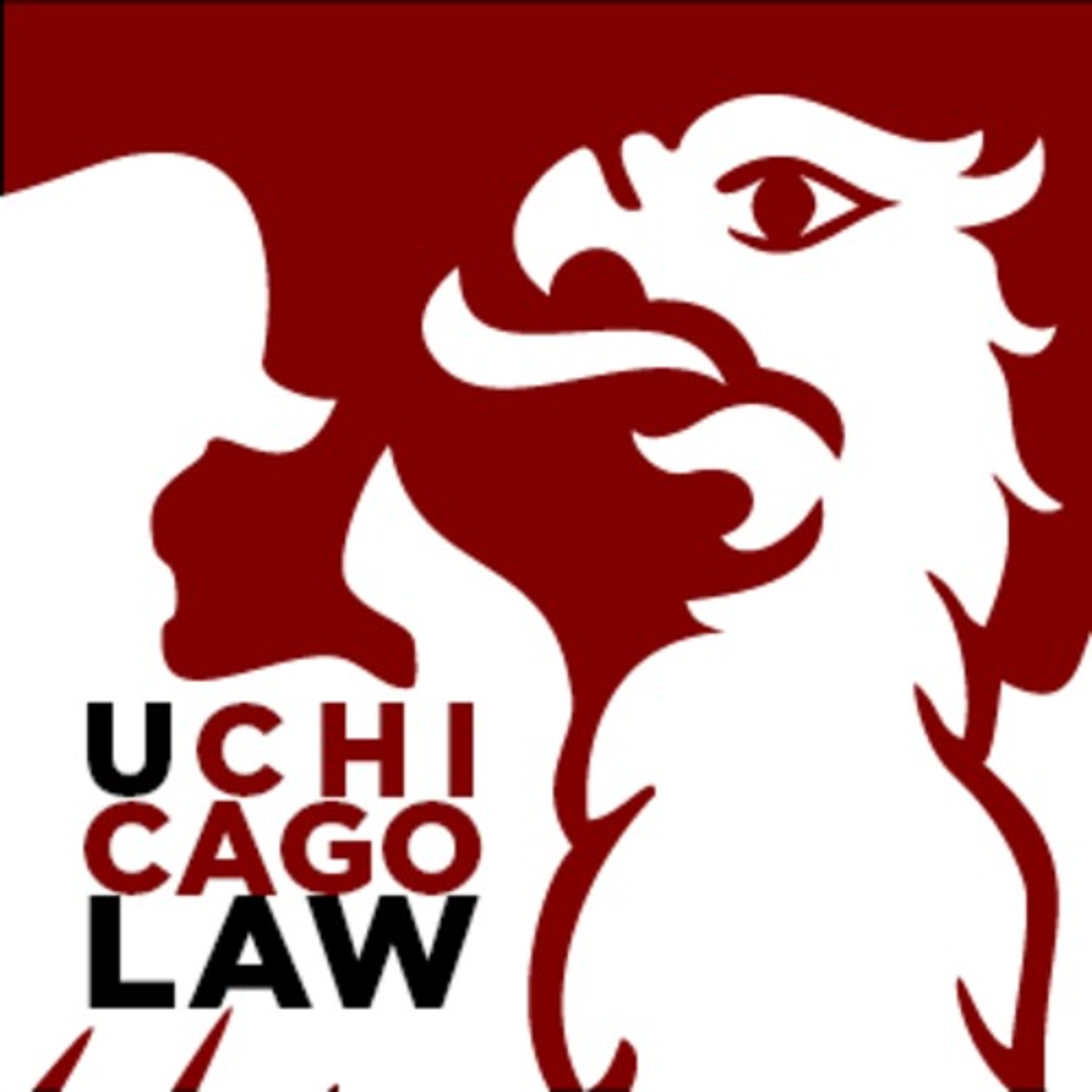
The University of Chicago Law School Faculty PodcastPanel: "Ferguson and Beyond: Criminal Procedure and Police Killings"This panel was moderated by Professor Siegler and included Deputy Dean Ginsburg and Professors Huq, McAdams, and Randolph Stone.
The event took place on February 4, 2015. It was presented by BLSA in partnership with the Law School and cosponsored by ACS, APALSA, Criminal Law Society, Defenders, Human Rights Law Society, LLSA, LSRJ, LWC, PILS, and SALSA.
2015-03-0357 min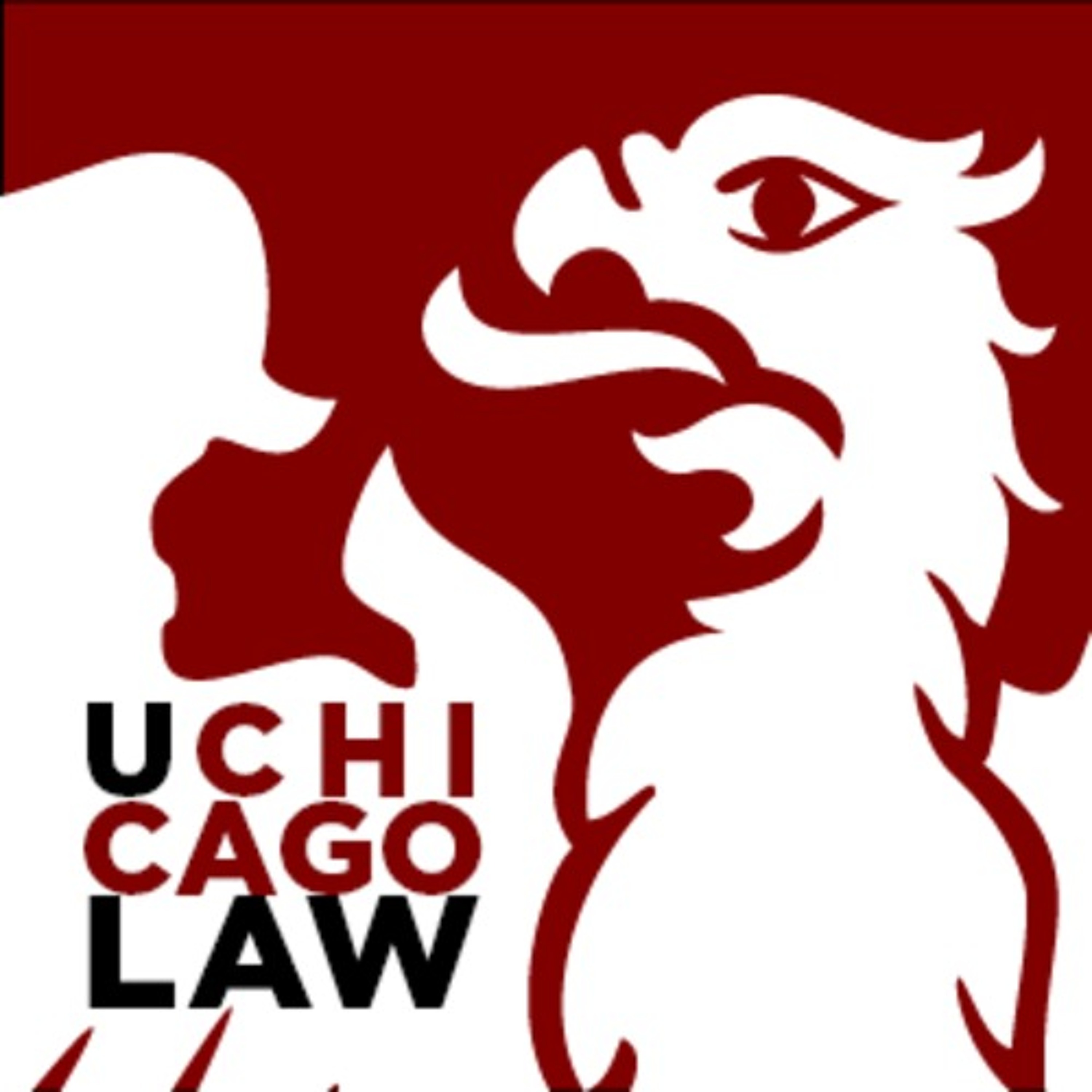
The University of Chicago Law School Faculty PodcastA Conversation With Elena KaganIn a conversation with David A. Strauss, Gerald Ratner Distinguished Service Professor of Law, US Supreme Court Justice Elena Kagan reflects on decision-making, persuasion, and hunting with Scalia.
This event took place on February 2, 2015, at the University of Chicago Law School.
2015-02-111h 14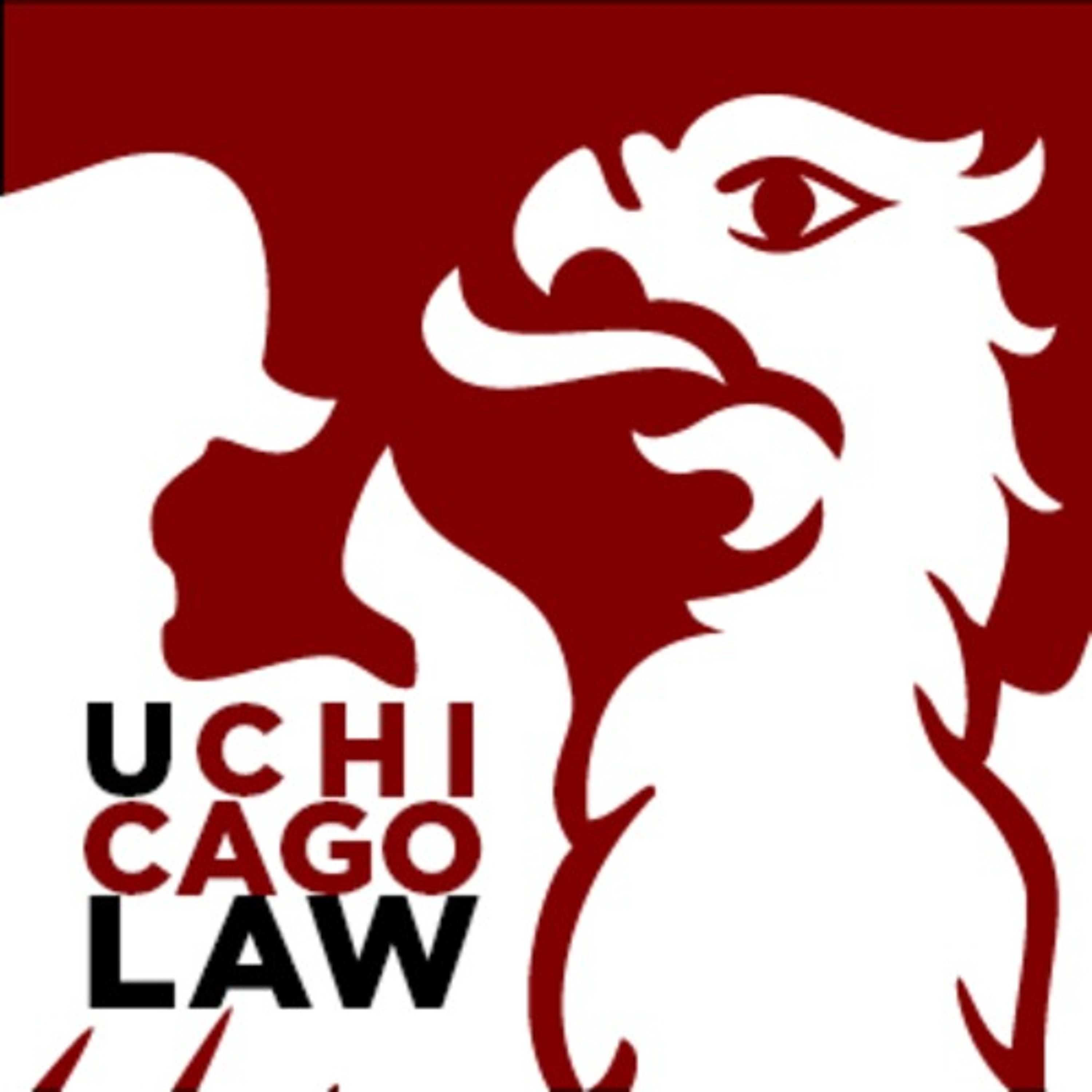
The University of Chicago Law School Faculty PodcastWill the Supreme Court Make Disparate Impact Disappear?A panel discussion with John Relman, Jeff Leslie, Lee Fennell, and Tara Ramchandani
As part of the Law School's Diversity Month, the panelists discuss the pending Supreme Court Case, "Texas Department of Housing and Community Affairs v. The Inclusive Communities Project."
Presented on January 21, 2015, by ACS, ACLU, BLSA and APALSA with the Kreisman Initiative on Housing Law and Policy.
2015-02-0453 min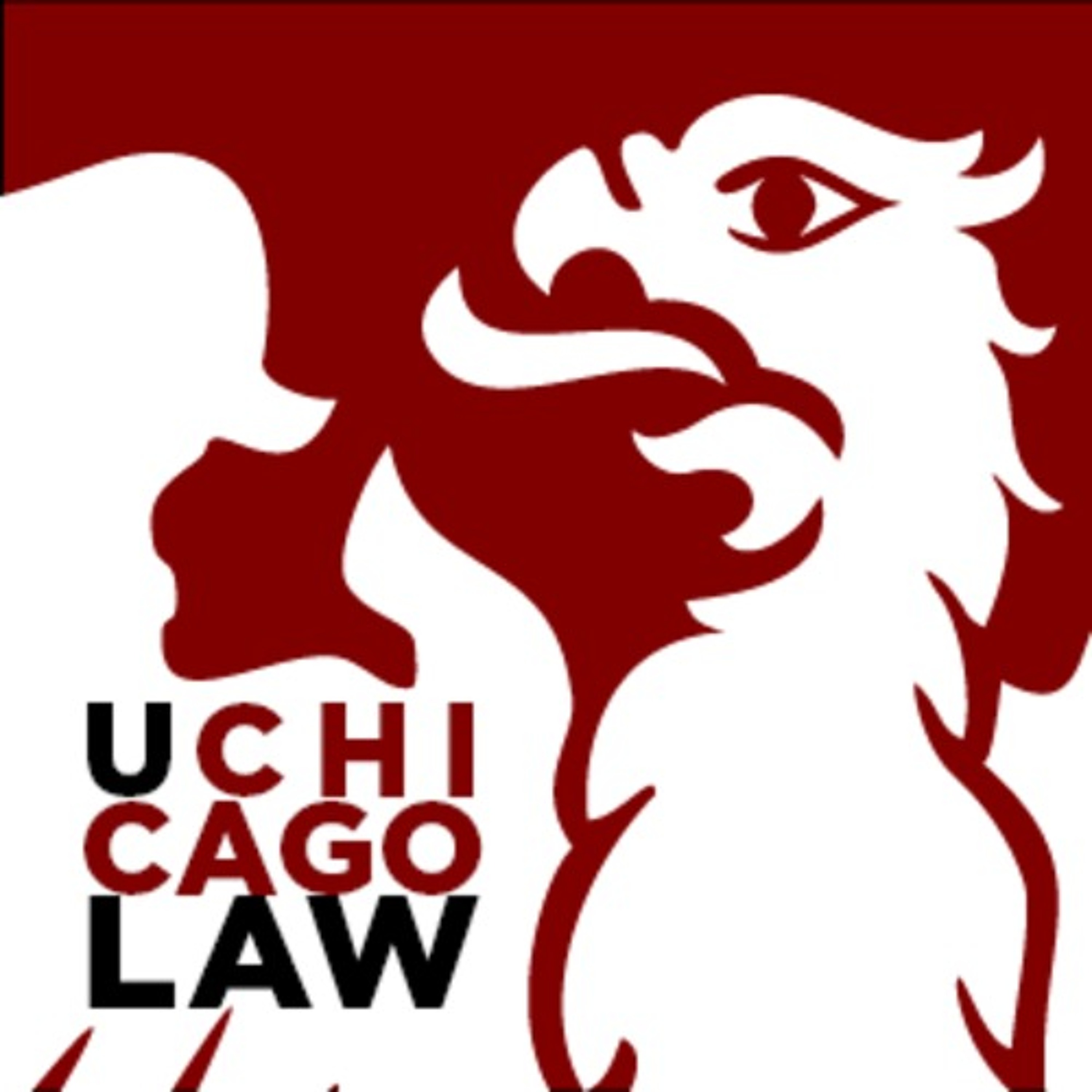
The University of Chicago Law School Faculty PodcastMartha Minow, "Forgiveness, Law and Justice"Martha Minow, Morgan and Helen Chu Dean and Professor of Law, Harvard Law School
with comments by Martha Nussbaum, Aziz Huq, and Michael Schill
What role if any should forgiveness play in law and legal systems? By forgiveness, I mean: a conscious, deliberate decision to forgo rightful grounds for whoever has committed a wrong or harm. Law may penalize those who apologize and in so doing make forgiveness by the victim less likely. Law may construct adversarial processes that render forgiveness less likely than it would otherwise be. Or law can give people chances to meet together, in spaces where...
2015-01-291h 39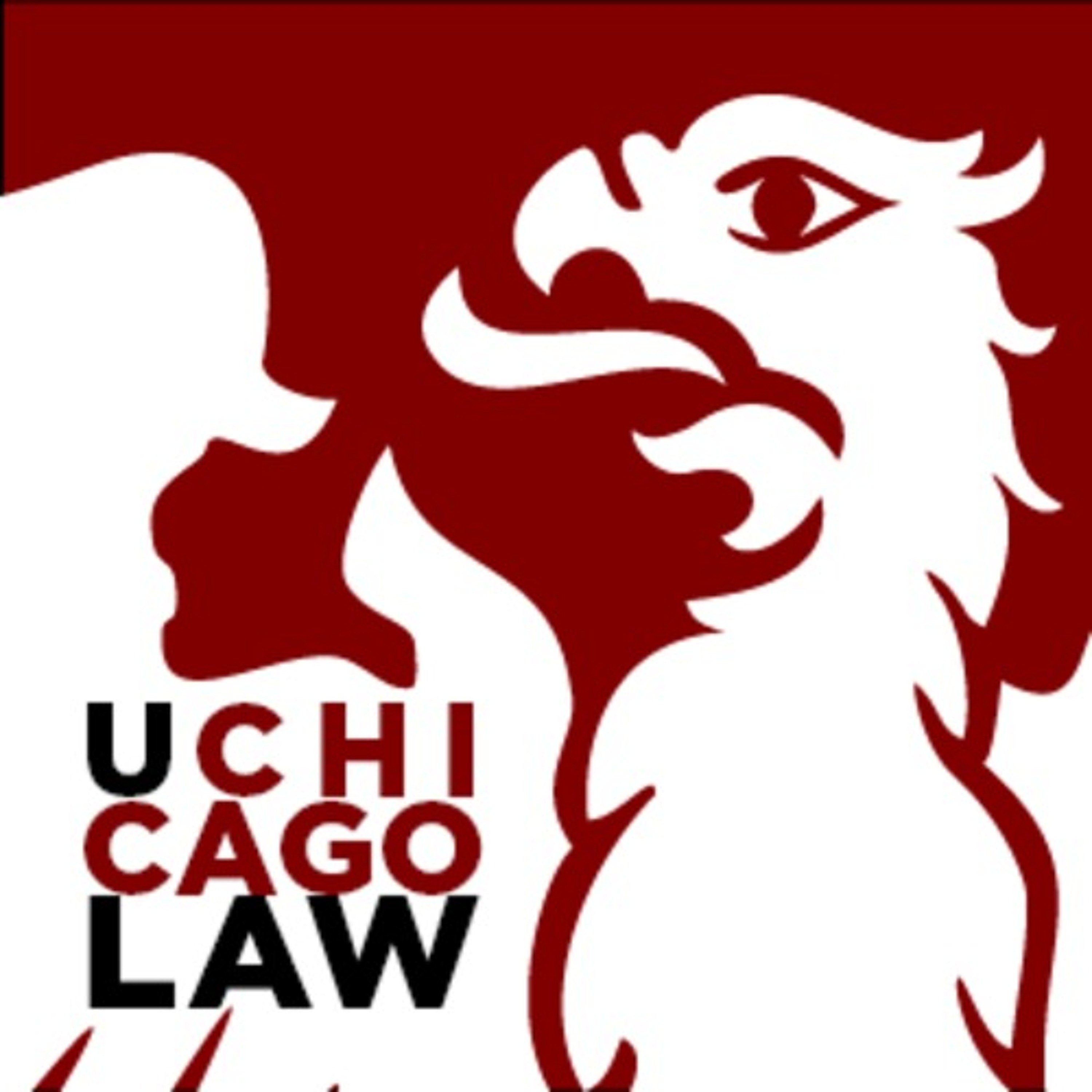
The University of Chicago Law School Faculty PodcastRichard McAdams, "How Law Works Expressively"Although people sometimes violate the law, there is more legal compliance than we can explain by ordinary economic theory – that legal sanctions deter noncompliance. In some domains of international law and constitutional law, there is no credible threat of legal sanctions, yet there is compliance. In some historic examples, “courts” lacking any sanctioning power resolved disputes arising in medieval Iceland, among 18th century pirates, and among 19th century gold-rushers. Professor McAdams explains these and other historic and contemporary examples of compliance by focusing attention on law’s expressive power. First, legal expression provides a salient means of coordinating behavior. Second, law reve...
2015-01-0855 min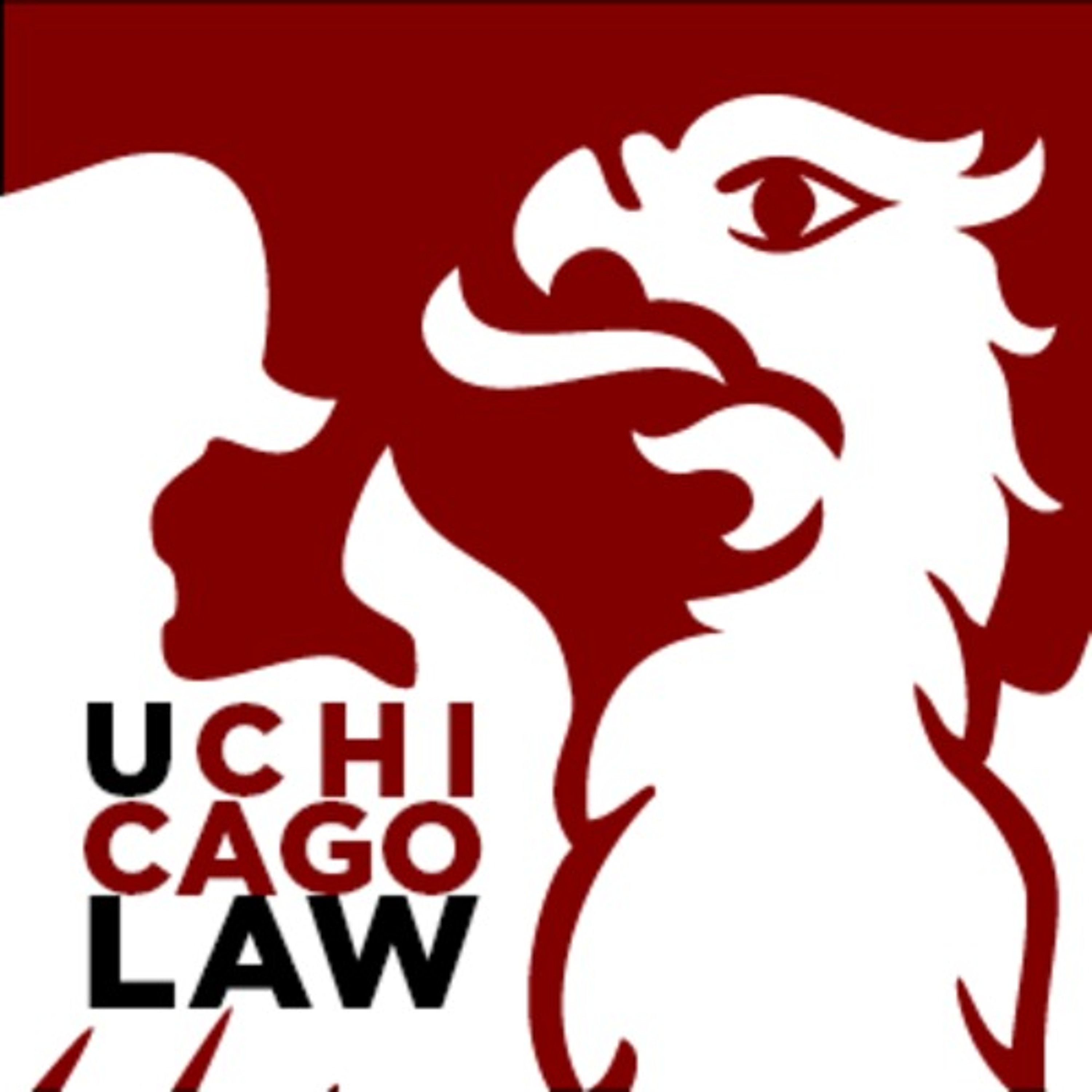
The University of Chicago Law School Faculty PodcastBaude, Harel, & McAdams, "How Should We Interpret our Constitutions?"How Should We Interpret our Constitutions?
A Debate between Professors Baude and Harel
Moderated by Professor McAdams
William Baude is Neubauer Family Assistant Professor of Law at the University of Chicago Law School, where he teaches federal courts and constitutional law. His current research projects include papers on originalism, historical practice in constitutional law, federalism, the Supreme Court, and conflicts of law. His recent publications include "Rethinking the Federal Eminent Domain Power," and "Beyond DOMA: State Choice of Law in Federal Statutes." He also contributes to two legal blogs, the Volokh Conspiracy and SCOTUSBlog.
Alon Harel is Mizock Professor of...
2014-12-041h 01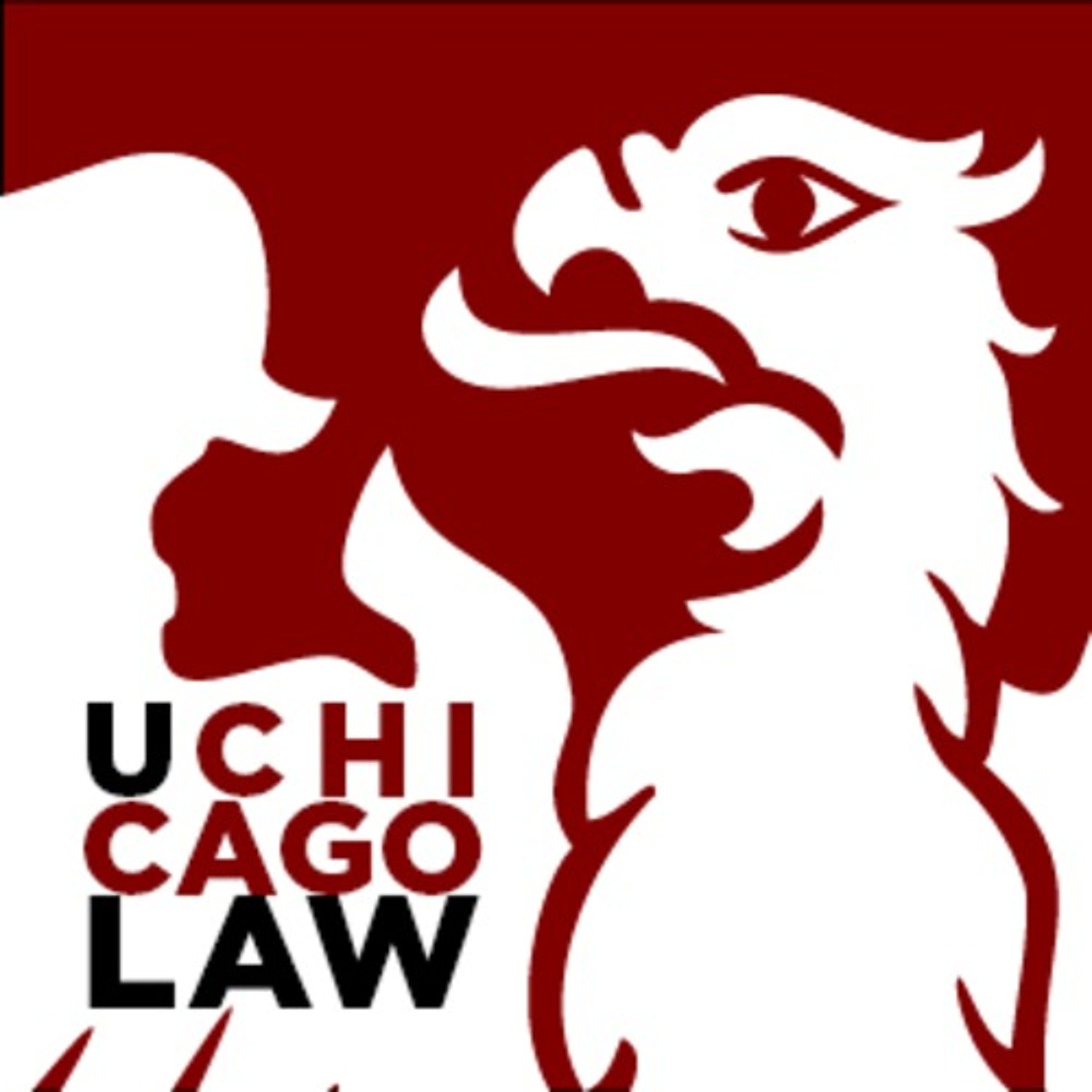
The University of Chicago Law School Faculty PodcastAdam Chilton, "Why We Know Very Little About the Effectiveness of International Law"While scholars in most fields argue about how laws can be changed to maximize their effectiveness, scholars of international law still regularly debate whether many of the most prominent international agreements have any effect on state behavior. Part of the reason that this foundational question is still being debated is that answering it with observational data has proven to be all but impossible. This talk will explain why research on international law has made so little progress determining whether two core areas of international law—human rights law and the laws of war—help to improve people’s lives, and then w...
2014-11-1857 min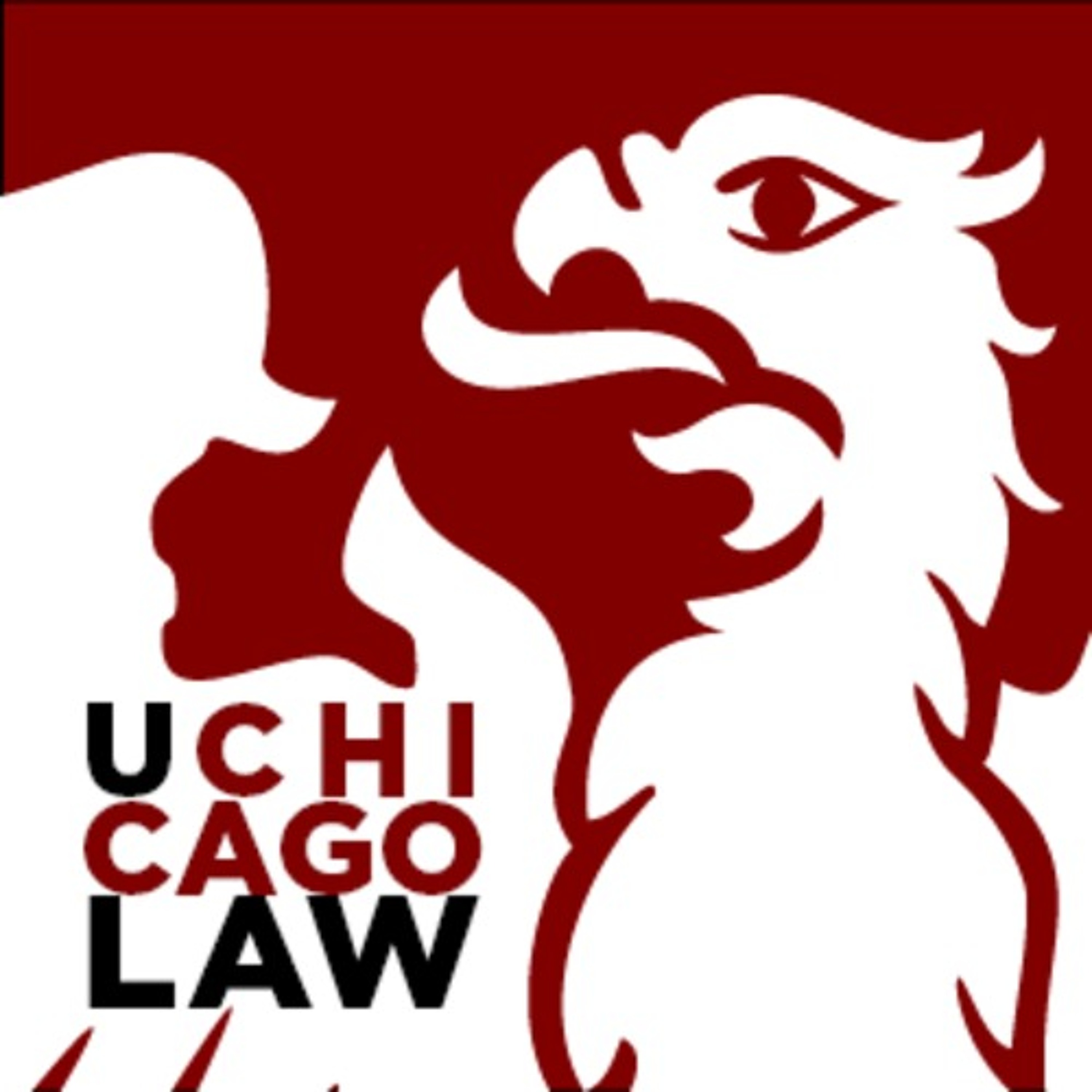
The University of Chicago Law School Faculty PodcastRichard Posner, Empirical Legal Studies Conference keynoteRichard A. Posner, Senior Lecturer in Law and a judge on the Seventh Circuit Court of Appeals, devoted a lunchtime keynote to discussing how judges might receive and view empirical research.
Richard A. Posner is a Senior Lecturer in Law at the University of Chicago Law School. Following his graduation from Harvard Law School, Judge Posner clerked for Justice William J. Brennan, Jr. From 1963 to 1965, he was assistant to Commissioner Philip Elman of the Federal Trade Commission. For the next two years, he was assistant to the solicitor general of the United States. Prior to going to Stanford Law School...
2014-11-1347 min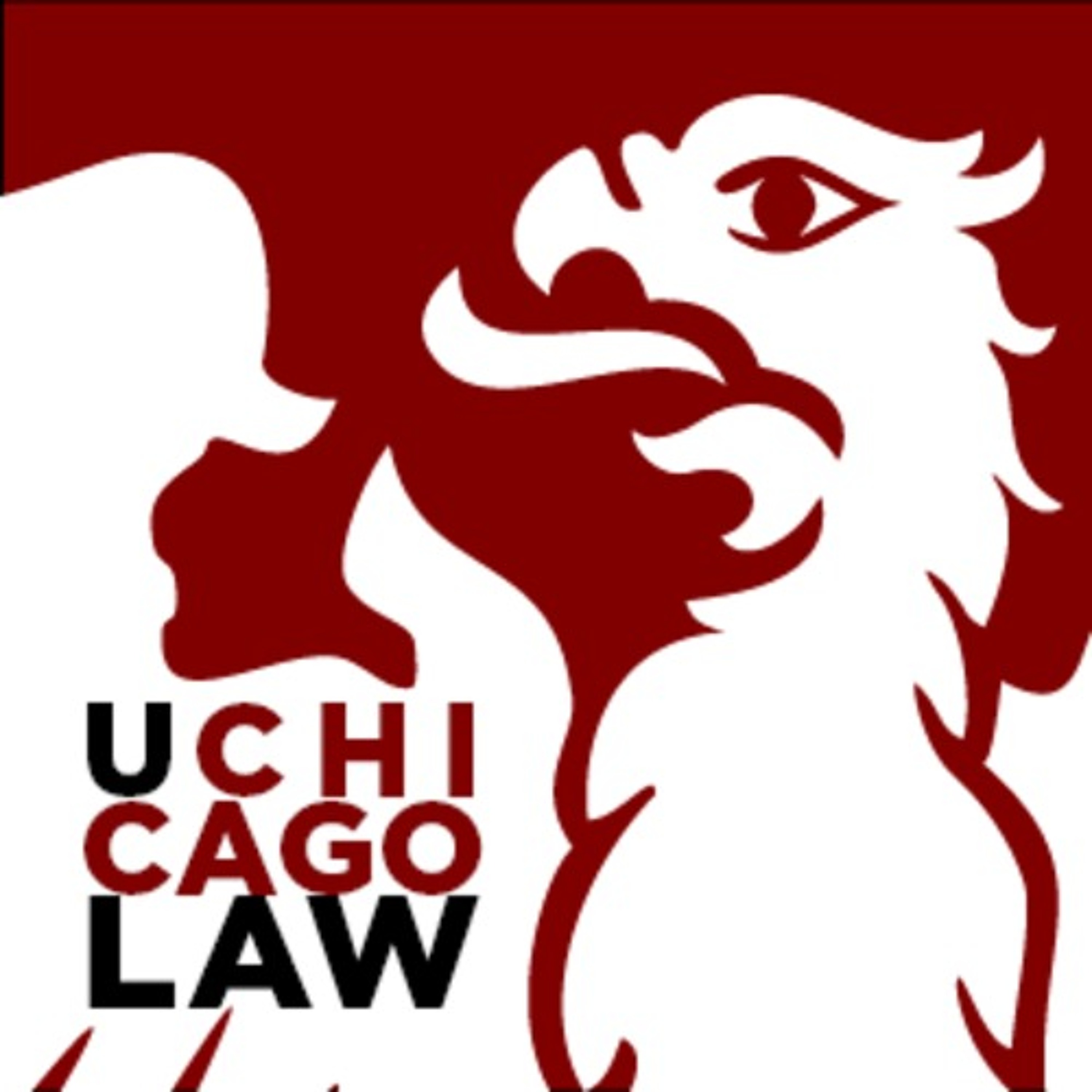
The University of Chicago Law School Faculty PodcastSaul Levmore, "How Does Law Work? Concentration and Distribution Strategies"Two of the best ideas of the last half-century describe strategies for using legal remedies to solve social problems. One is the concentration of liability on a well-situated problem solver, or “least cost-avoider,” who can always contract out the work to be done (thus reflecting Chicago’s Very Best and Biggest Idea, the Coase Theorem). But another is the opposite of the first, for it involves the distribution, or spreading, of legal responsibility across many potential problem solvers, who might cooperate or work alone. Comparative negligence and Superfund liability for environmental harms reflect this strategy.
This Chicago’s Best Ideas talk exp...
2014-11-0756 min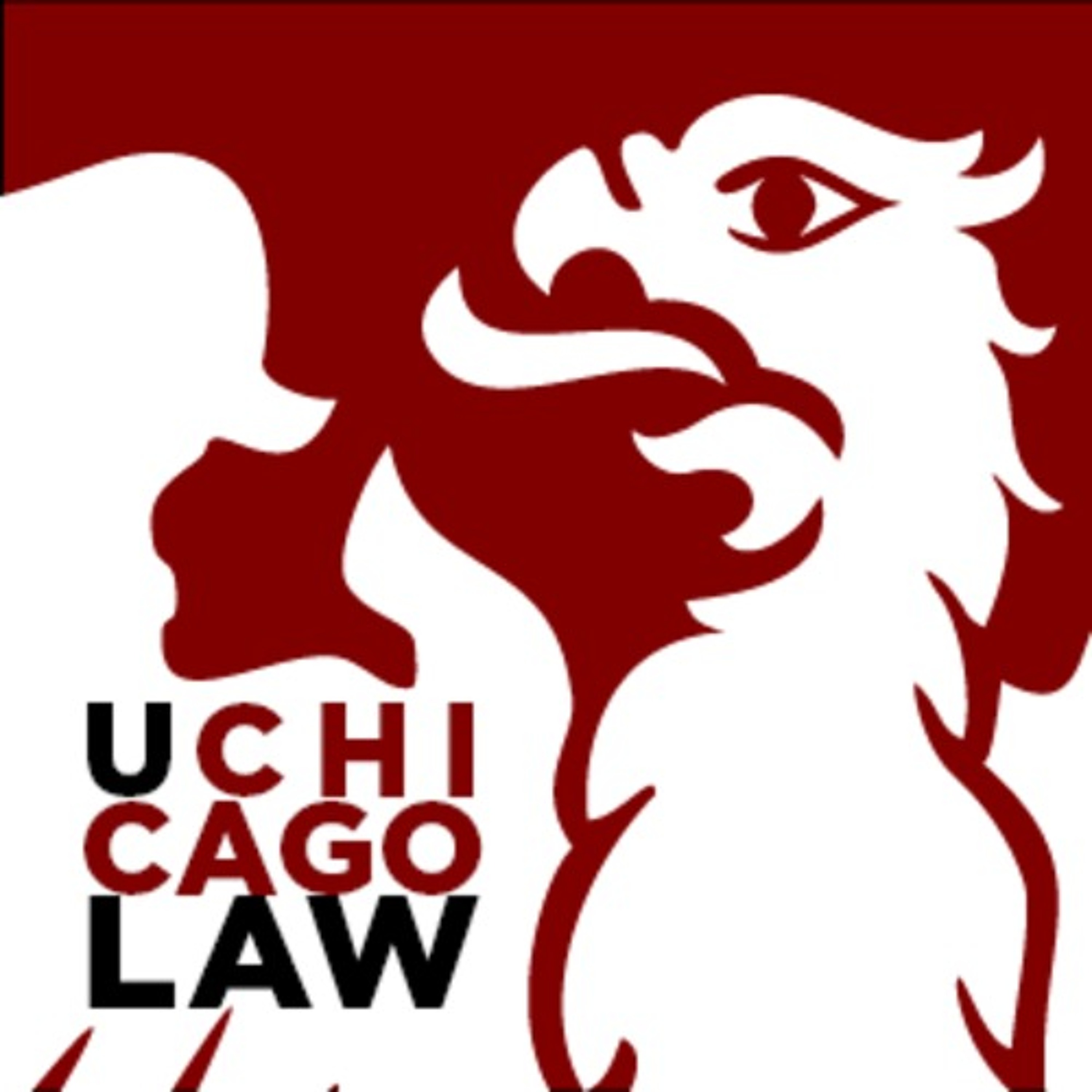
The University of Chicago Law School Faculty PodcastDriver, Nou & Strauss, "Constitutional Interpretation at the Roberts Court"Supreme Court Preview: Constitutional Interpretation at the Roberts Court
Hear Professors Justin Driver, Jennifer Nou, and David Straussdiscuss what divides the current Court and what unites it. Their lecture will be followed by a lively Q&A session with alumni and guests in attendance.
This First Monday alumni event was recorded on October 1, 2014 in Washington, DC.
2014-10-131h 15The University of Chicago Law School Faculty PodcastTomiko Brown-Nagin, "The Honor and Burden of Being First: Judge Constance Baker Motley"Professor Brown-Nagin's talk examines the legacy of The Honorable Constance Baker Motley—and break new ground in the study of civil rights, women's rights, and the legal profession. A protégée of Thurgood Marshall, Motley litigated in southern courtrooms during the 1940s and 1950s, when women lawyers scarcely appeared before the bar. She captivated onlookers who had rarely seen a woman or a black lawyer, much less the extraordinary combination—a black woman lawyer.
In 1966 Motley then became the first African-American woman appointed to the federal judiciary. After a long confirmation battle, she ascended to the United States District Court...
2014-06-051h 22The University of Chicago Law School Faculty PodcastM. Todd Henderson, "Do Judges Follow the Law?"In a naïve model of judging, Congress writes statutes, which courts know about and then slavishly apply. But a Chicago lawyer might doubt this model, believing judges are maximizing something other than compliance with the law. In this CBI, Professor Henderson examines judicial compliance with a mandatory Congressional command, and uses it to offer a richer and more nuanced model of judicial behavior.
M. Todd Henderson is Professor of Law and Aaron Director Teaching Scholar at the University of Chicago Law School. This talk was recorded on April 15, 2014, as part of the Chicago's Best Ideas lecture series.
2014-06-031h 04The University of Chicago Law School Faculty PodcastA Fireside Chat with David Sacks '98, Founder and CEO of YammerProfessor Todd Henderson leads an engaging discussion with Yammer Founder and CEO, David Sacks.
David has been involved in the Internet space more than 10 years as an entrepreneur, executive and investor, starting with PayPal in 1999. He was PayPal's chief operating officer and product leader, taking the company from startup to IPO and eventual sale to eBay for $1.5 billion. Subsequently, he founded Geni.com, a genealogy website that enables millions of family members to collaboratively build an online family tree. Geni was acquired by MyHeritage in 2012. He also produced and financed the movie "Thank You For Smoking." Also in 2012, David sold...
2014-05-291h 08The University of Chicago Law School Faculty PodcastLaws Prohibiting Sex-Selective Abortion in the United StatesAs part of the anti-abortion movement's legislative campaign, seven states have passed bans on sex-selective abortion and many more are pending, including in Congress. Advocates of the bans argue that they are needed to prevent widespread elimination of female fetuses by Asians in the United States. They argue that the United States is contributing to the global pandemic of "missing women" and that sex-selective abortion must be banned to promote women's equality. Opponents of these bills point out that they are a "wolf in sheep's clothes" couched in the language of women's equality, but restricting women's autonomy and unfairly stigmatizing...
2014-05-2138 minThe University of Chicago Law School Faculty PodcastR.H. Helmholz, "Magna Carta: A European Perspective"This talk was recorded on April 25, 2014, as the Law School's annual Loop Luncheon.
2014-05-1542 minThe University of Chicago Law School Faculty PodcastDavid Strauss, "Does the Constitution Always Mean What It Says?"The U.S. Constitution is "the supreme Law of the Land." Of course some of its provisions are vague and must be interpreted. But when the Constitution says something clearly, we follow it. Don't we?
Actually things are not that simple. There are several important examples of clear language in the Constitution that we do not follow. (For an example, look at the first word of the First Amendment.) Sometimes, in fact, it would be essentially unthinkable to follow themost obvious meaning of apparently clear language.
These are not just slips of the pen by the Framers of the Constitution...
2014-05-1356 min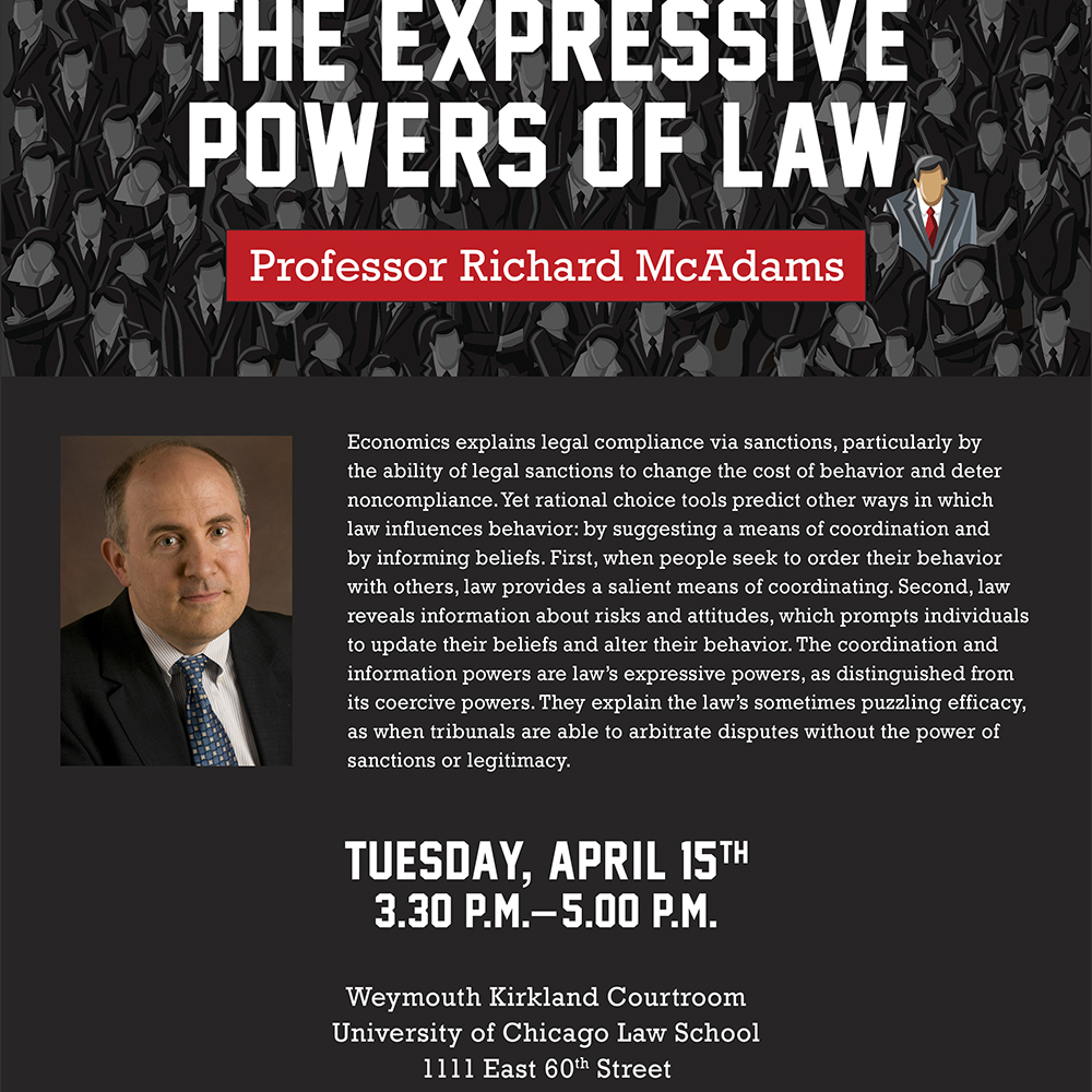
The University of Chicago Law School Faculty PodcastRichard McAdams, "The Expressive Powers of Law"Economics explains legal compliance via sanctions, particularly by the ability of legal sanctions to change the cost of behavior and deter noncompliance. Yet rational choice tools predict other ways in which law influences behavior: by suggesting a means of coordination and by informing beliefs. First, when people seek to order their behavior with others, law provides a salient means of coordinating. Second, law reveals information about risks and attitudes, which prompts individuals to update their beliefs and alter their behavior. The coordination and information powers are law's expressive powers, as distinguished from its coercive powers. They explain the law's sometimes...
2014-05-081h 30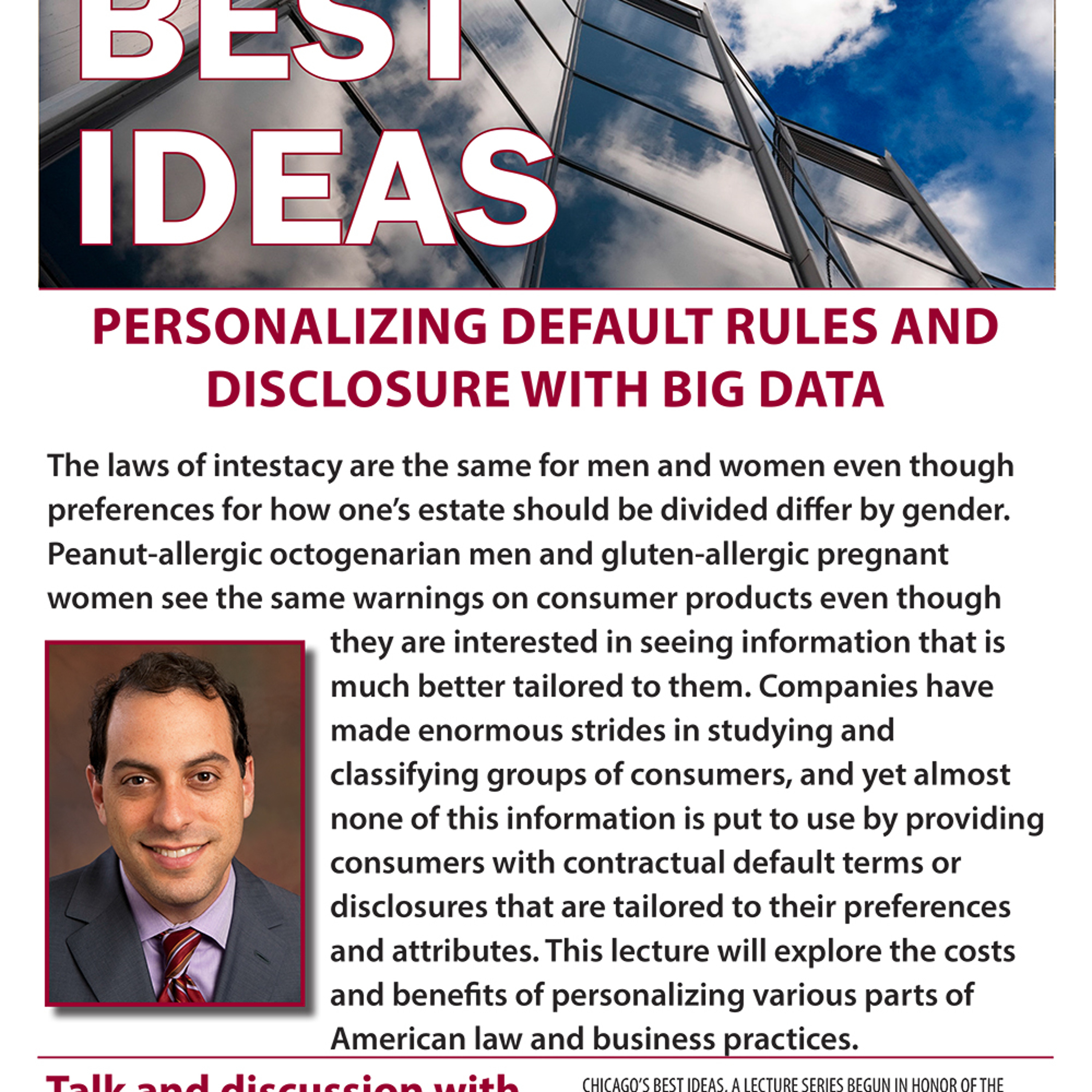
The University of Chicago Law School Faculty PodcastLior Strahilevitz, "Personalizing Default Rules and Disclosure with Big Data"The laws of intestacy are the same for men and women even though preferences for how one's estate should be divided differ by gender. Peanut-allergic octogenarian men and gluten-allergic pregnant women see the same warnings on consumer products even though they are interested in seeing information that is much better tailored to them. Companies have made enormous strides in studying and classifying groups of consumers, and yet almost none of this information is put to use by providing consumers with contractual default terms or disclosures that are tailored to their preferences and attributes. This lecture will explore the costs and...
2014-04-2449 min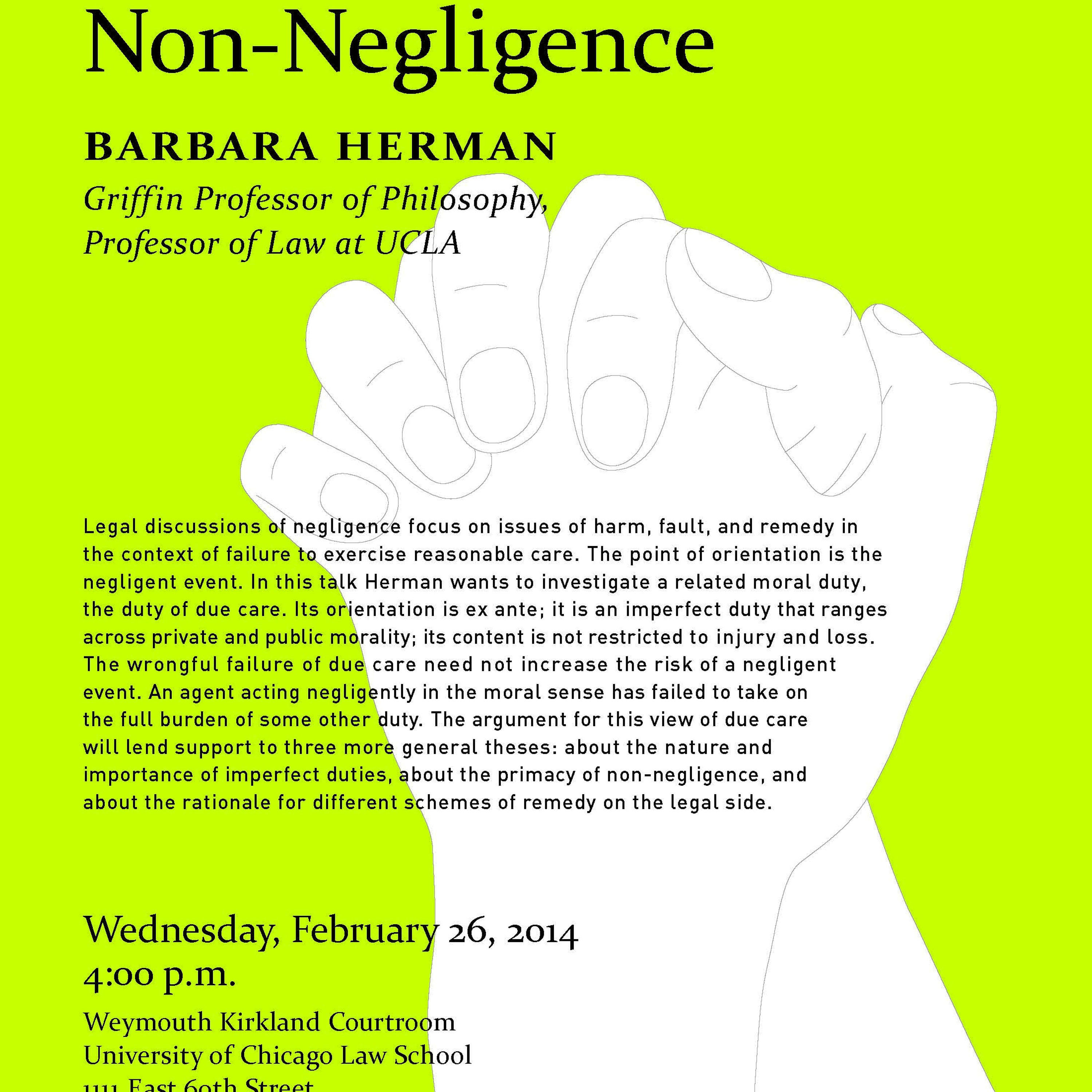
The University of Chicago Law School Faculty PodcastBarbara Herman, "The Moral Side of Non-Negligence"Legal discussions of negligence focus on issues of harm, fault, and remedy in the context of failure to exercise reasonable care. The point of orientation is the negligent event. In this talk I want to investigate a related moral duty, the duty of due care. Its orientation is ex ante; it is an imperfect duty that ranges across private and public morality; its content is not restricted to injury and loss. The wrongful failure of due care need not increase the risk of a negligent event. An agent acting negligently in the moral sense has failed to take on the...
2014-04-101h 40The University of Chicago Law School Faculty PodcastTom Ginsburg, Jonathan Masur, and Richard McAdams, "Temporary Law: The Case of Smoking Bans"Libertarians often assert that regulation is unnecessary because the market will meet any existing consumer demand. The issue of smoking in bars is a paradigmatic context in which this argument arises. Libertarians argue that bar patrons (and employees) are free to patronize or work in whichever bars they choose. Accordingly, if workers or patrons want smoke-free bars, the market will provide smoke-free bars. For the libertarian, the fact that nearly every bar in every city allowed smoking prior to the enactment of smoking bans is proof that this is what employees and patrons really want. The market equilibrium is the...
2014-03-271h 02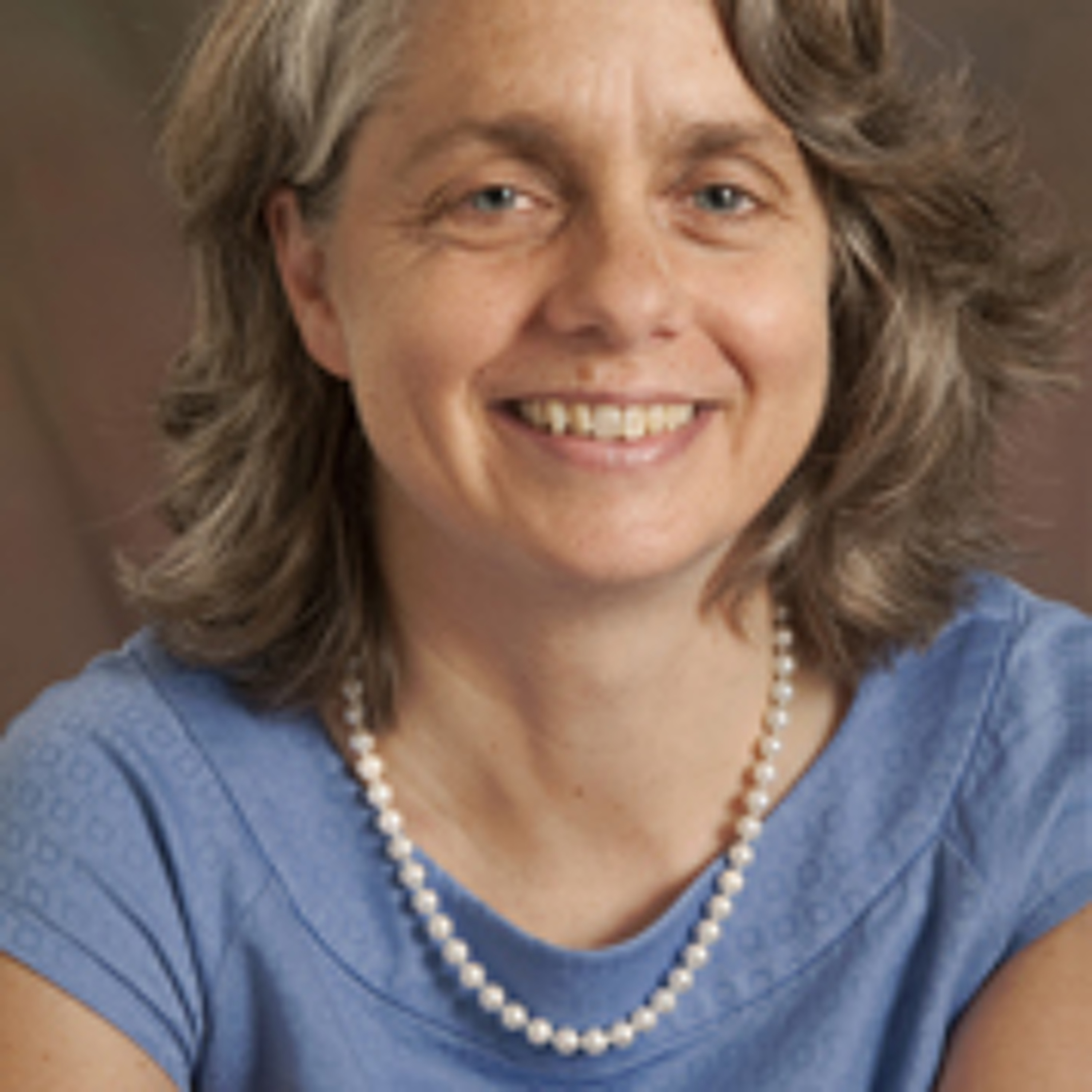
The University of Chicago Law School Faculty PodcastEmily Buss, "Court Reform in the Juvenile Justice System"Over 100 years ago, Chicago led the way in establishing separate courts for young people who committed crimes. These Juvenile Courts, soon in operation in every state, had two interrelated aims: The first was to separate adolescent offenders from adult criminals. The second aim was to help young offenders to grow up to become law-abiding citizens, although we knew much less than we thought we did about how to do this. In recent years, we have learned a great deal from psychologists and brain scientists about how young people develop and what affects that development, and that knowledge has increasingly been...
2014-03-1353 minThe University of Chicago Law School Faculty PodcastGeoffrey Stone, "The President's Review Group on NSA Surveillance"Edward H. Levi Distinguished Service Professor Geoffrey Stone talks about his involvement in the President's Review Group on Intelligence and Communications Technology. Organized by the Office of the Dean of Students and recorded on February 4, 2014.
2014-02-271h 07The University of Chicago Law School Faculty PodcastMartha Nussbaum, "What Is Anger, and Why Should We Care?""Although everyone is familiar with the damage anger can do in both personal and public life, people tend to think that it is necessary for the pursuit of justice. People who don't get angry when they are wronged seem weird to many people, lacking spine and self-respect. And isn't it servile not to react with anger to great injustice, whether toward oneself or toward others? On the other hand, recent years have seen three noble and successful freedom movements conducted in a spirit of non-anger: those of Mohandas Gandhi, Martin Luther King, Jr., and Nelson Mandela -- surely people who...
2014-02-201h 05The University of Chicago Law School Faculty PodcastBrian Leiter, "Why Tolerate Religion?"Is there a principled reason why religious obligations that conflict with the law are accorded special toleration while other obligations of conscience are not? In Why Tolerate Religion? (Princeton, 2013), Professor Leiter argues there are no good reasons for doing so, that the reasons for tolerating religion are not specific to religion but apply to all claims of conscience. He also argues that a government committed to liberty of conscience is not required by the principal of toleration to grant burden-shifting exemptions to laws that promote the general welfare.
Brian Leiter is Karl N. Llewellyn Professor of Jurisprudence and Director, Center...
2014-02-2057 minThe University of Chicago Law School Faculty PodcastNicholas Stephanopoulos, "The South After Shelby County"In Shelby County v. Holder, the Supreme Court dismantled one of the two pillars of the Voting Rights Act: Section 5, which had barred southern jurisdictions from changing their election laws unless they first received federal approval. The burning question now is what will happen to minority representation in the South in the absence of Section 5. In this talk, Prof. Stephanopoulos explores the differences between the defunct Section 5 and Section 2 of the VRA, which continues to apply nationwide. His sobering conclusion is that Section 2 provides substantially less protection with respect to both redistricting and franchise restrictions. The demise of Section 5 is...
2014-02-2052 minThe University of Chicago Law School Faculty PodcastPanel on "Reconstructing Contracts: The Contracts Scholarship of Douglas Baird"A panel of leading scholars discuss Douglas Baird's pathbreaking work on Contract Law published in his new book Reconstructing Contracts.
Avery Katz, Vice Dean and Milton Handler Professor of Law, Columbia Law School
Stewart Macaulay, Malcolm Pitman Sharp Professor & Theodore W. Brazeau Professor, University of Wisconsin Madison Law School
Ariel Porat, The Alain Poher Chair in Private Law, Faculty of Law, Tel Aviv University
Moderated by Omri Ben-Shahar, Leo and Eileen Herzel Professor of Law and Economics and Kearney Director of the Coase-Sandor Institute for Law & Economics, University of Chicago Law School.
This panel was recorded on October 23, 2013.
2014-02-201h 05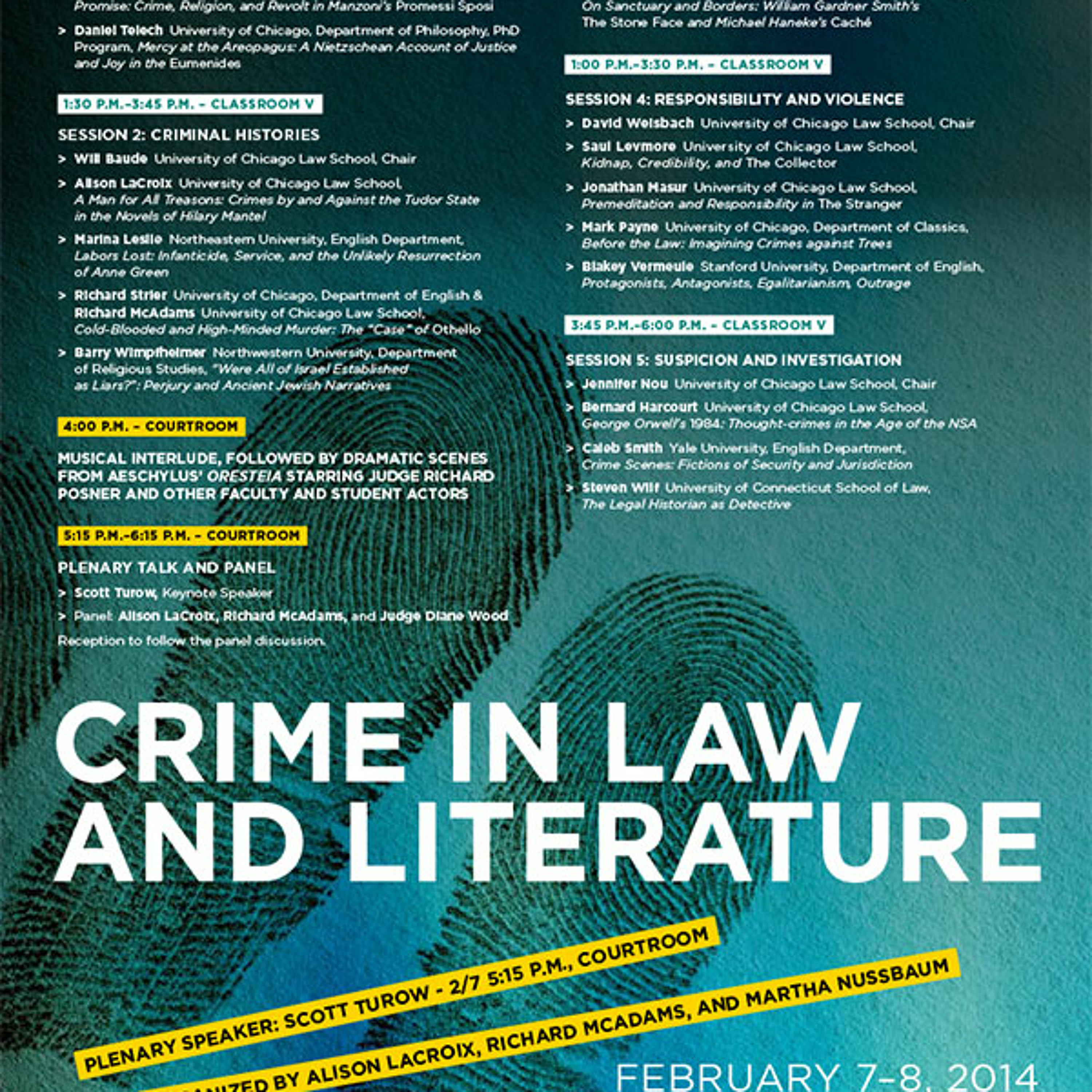
The University of Chicago Law School Faculty PodcastCrime in Law and Literature Conference Plenary Talk and Panel, featuring Scott TurowRecorded on February 7, 2014, at the University of Chicago Law School, this session featured author Scott Turow as Plenary Speaker and Law School faculty Alison LaCroix, Judge Diane Wood, and Richard McAdams.
2014-02-121h 19